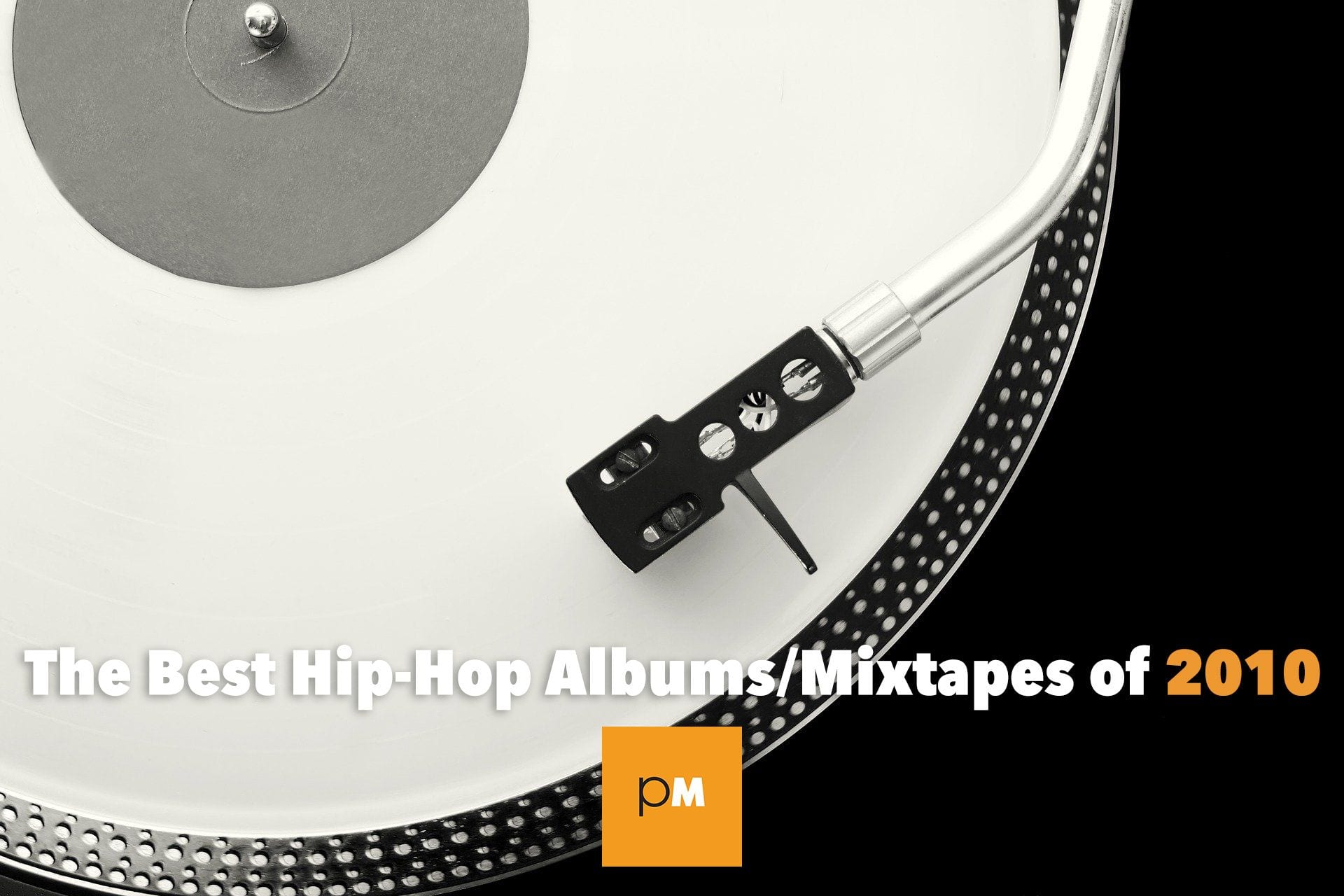12. Hezekiah – Conscious Porn [Fat Beats/Select-O]
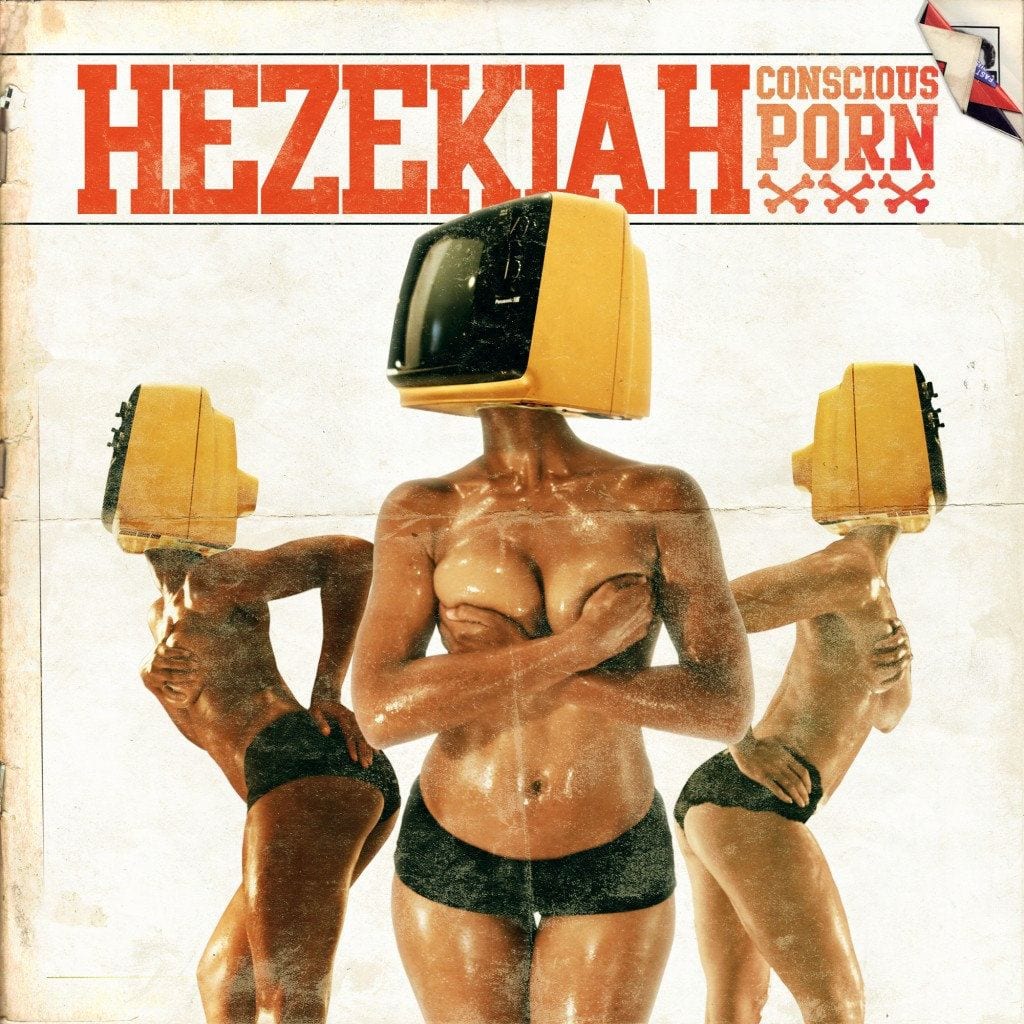
For my honorable mention pick, I had to choose between: Black Milk’s Album of the Year (which I’ve spun the heck out of since it dropped), Skyzoo & Illmind’s Live From the Tape Deck (which was dope), the hunger and passion in Eternia & Moss’ At Last, the return of a dynamic duo in Reflection Eternal’s Revolutions Per Minute, Kno’s fantastic production in Death Is Silent, and Serengeti & Hi-Fidel’s narrative concept album Saturday Night (which, logically, requires hearing 2009’s part one, Friday Night). I took the album less often reviewed, and that made all the difference (apologies to Robert Frost).
I’m going with Hezekiah’s Conscious Porn, a concept album in its own right in which a doctor endeavors to guide his female patient through a “mind-fucking” process that will shed her inhibitions and make her more open-minded. While the skits make opening your mind sound similar to the group-think they are designed to denounce, the actual songs are forward-thinking and freewheeling, melding R&B, soul, James Brown funk, and rap into a swirling union. Bonus points for the album title, a song about the pressures of abortion (“The Clinic”), and the guest spots from Talib Kweli, Bahamadia, and Raheem DeVaughn. – Quentin B. Huff
LISTEN: Bandcamp
11. Earl Sweatshirt – EARL [OFWGKTA]
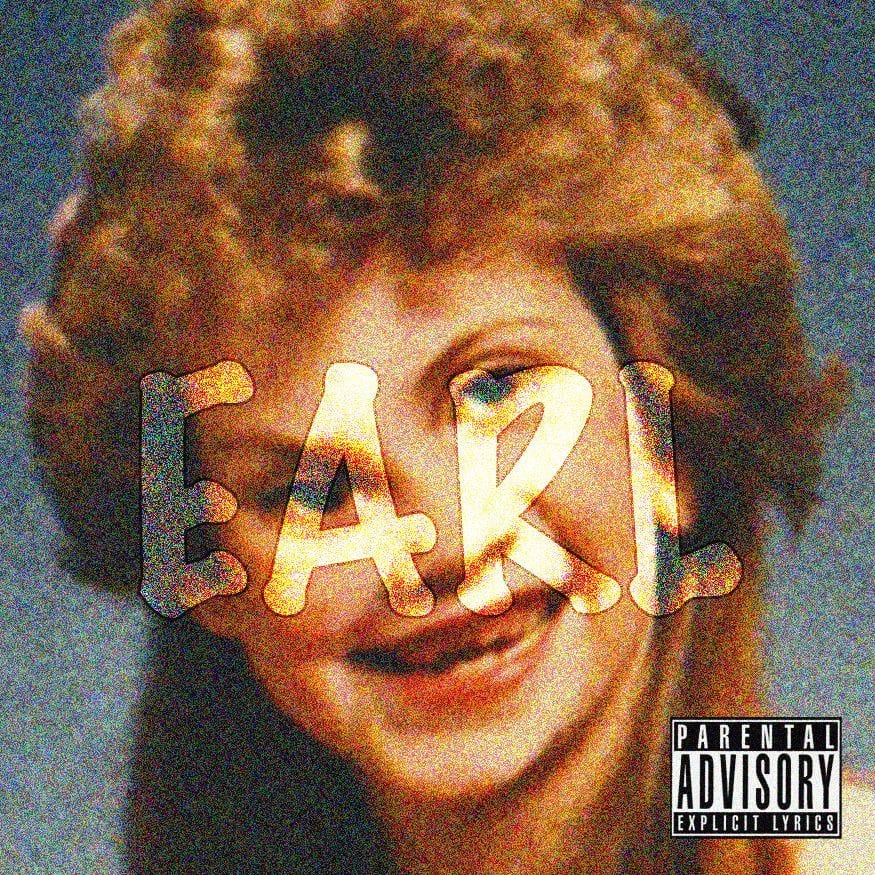
I struggled mightily between including either EARL or Smoke DZA’s George Kush da Button in this spot, so consider that your shout-out, DZA. But when thinking about the term “honorable mention”, and considering the similar Pilot Talk is already included on our list, I eventually decided we just had to give a nod to the Odd Future Wolf Gang Kill ‘Em All crew out of California. Spearheaded by Tyler the Creator, himself only 18 or 19, the group burst onto the blogosphere this year with a disgustingly unique style. Blending horrorcore motifs with spacey, Neptunes-circa-2002-style synth beats and everyman type raps, the crew seems destined to continue making marks in hip-hop for a while.
And none of their projects made this more evident than the works of then-15-year-old Earl Sweatshirt. His approach to lyricism is eerily similar to the most indulgent of early Eminem raps. He gleefully raps with a voice seemingly five years his senior about the ways in which he will rape and murder various women, while constantly managing to make the whole ordeal seem lighthearted and humorous. Lines like “I keep it flowing like blood out my competition’s slit wrists” are just too hard not to offer an approving head nod, and it’s something that doesn’t even jump out on first listen.
Earl’s rap is just so effortless, and his combination of MF DOOM and Eminem so appealing, that listening to this brief 30-minute free album should feel like an auditory vacation for most serious rap heads. In a genre where more and more artists seem more interested in imitating the successful ideas of others than crafting a unique lane for themselves, a 16-year-old kid manages to stand out more than most as a seriously dangerous MC.
EARL may one day prove to be little more than a hint of what’s to come. And that’s a problem, because as it stands Earl’s already proven himself easily capable of crafting one of the best albums in a given year. And he’s just getting started. – David Amidon
LISTEN: Bandcamp
10. Freeway & Jake One – The Stimulus Package [Rhymesayers]
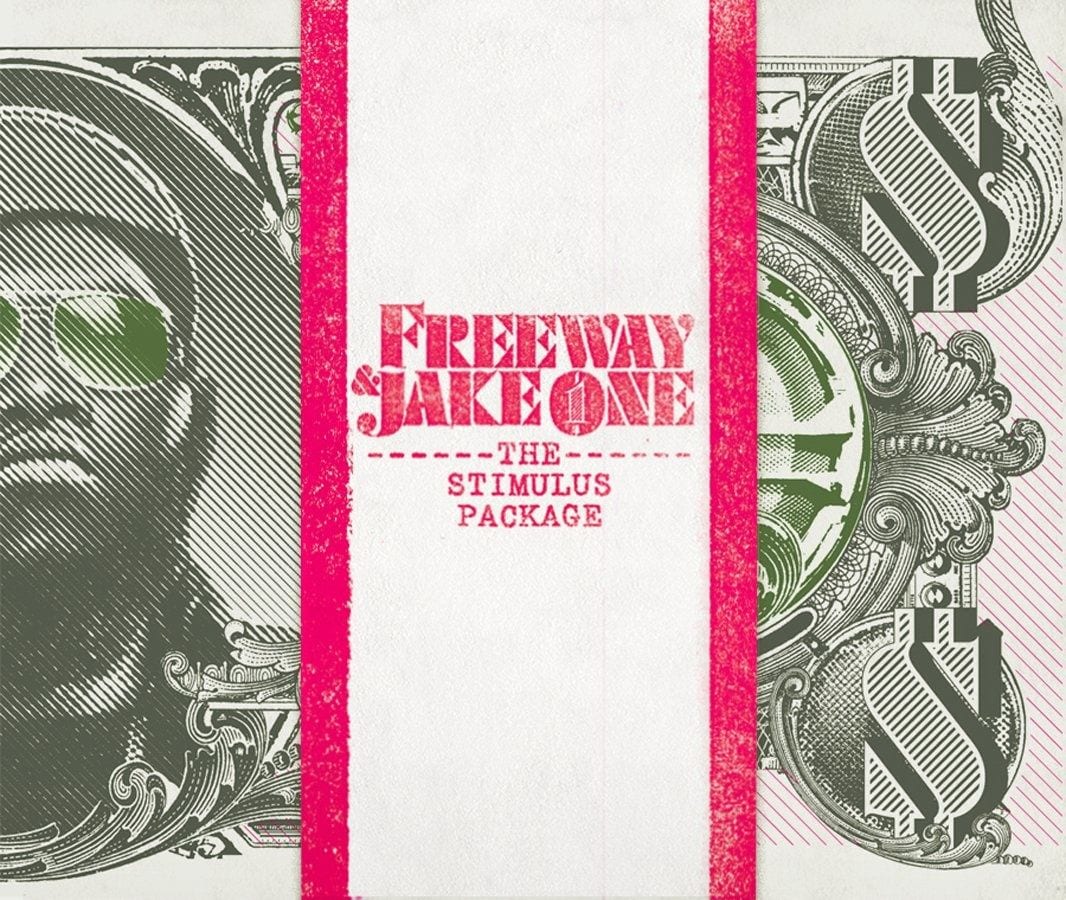
My fellow hip-hoppers, I am pleased to inform you that the heavily bearded Philadelphia, Pennsylvania, rapper Freeway and Seattle, Washington, producer Jake One have joined forces on this Rhymesayers release to demonstrate a strategy for reinvigorating the rap aesthetic. With The Stimulus Package, Freeway & Jake One have developed a program for getting our artistic economy back on track.
First, rhymers must utilize song concepts in such ways as: stringing a list of rap artists into a narrative (“Throw Your Hands Up”), analogizing the rap game to the drug game (“The Product”), constructing verses as fan letters à la Eminem’s “Stan” (“Stimulus Outro”), and personifying music as a passionate lover (“Freekin’ the Beat”). Second, it never hurts to display good old fashioned lyrical hunger, especially if you add the right details. It’s even better if you can weave in a compelling tale. Third, and despite what other folks do, the judicious inclusion of guest rappers is key — Raekwon, Bun B, Young Chris, Omilio Sparks, and Birdman are quite enough. You don’t want to get upstaged (although Bun B nearly steals the show with his cameo).
Finally, entrust your work to a fine beat maker who is diverse enough to give you punchy beats and rubbery bass lines for your boom bap, a smooth soul lean for your Jimmy Jam & Terry Lewis-style R&B joint, and the right tin-and-synth connection for your trap rap. Yes, The Stimulus Package could use some better hooks. But, look. Let’s be clear. Jumpstarting our ailing conditions won’t happen overnight. We, um, have to be vigilant. It takes time to craft rap you can believe in. – Quentin B. Huff
9. Nas & Damian Marley – Distant Relatives [Universal Republic/Def Jam]
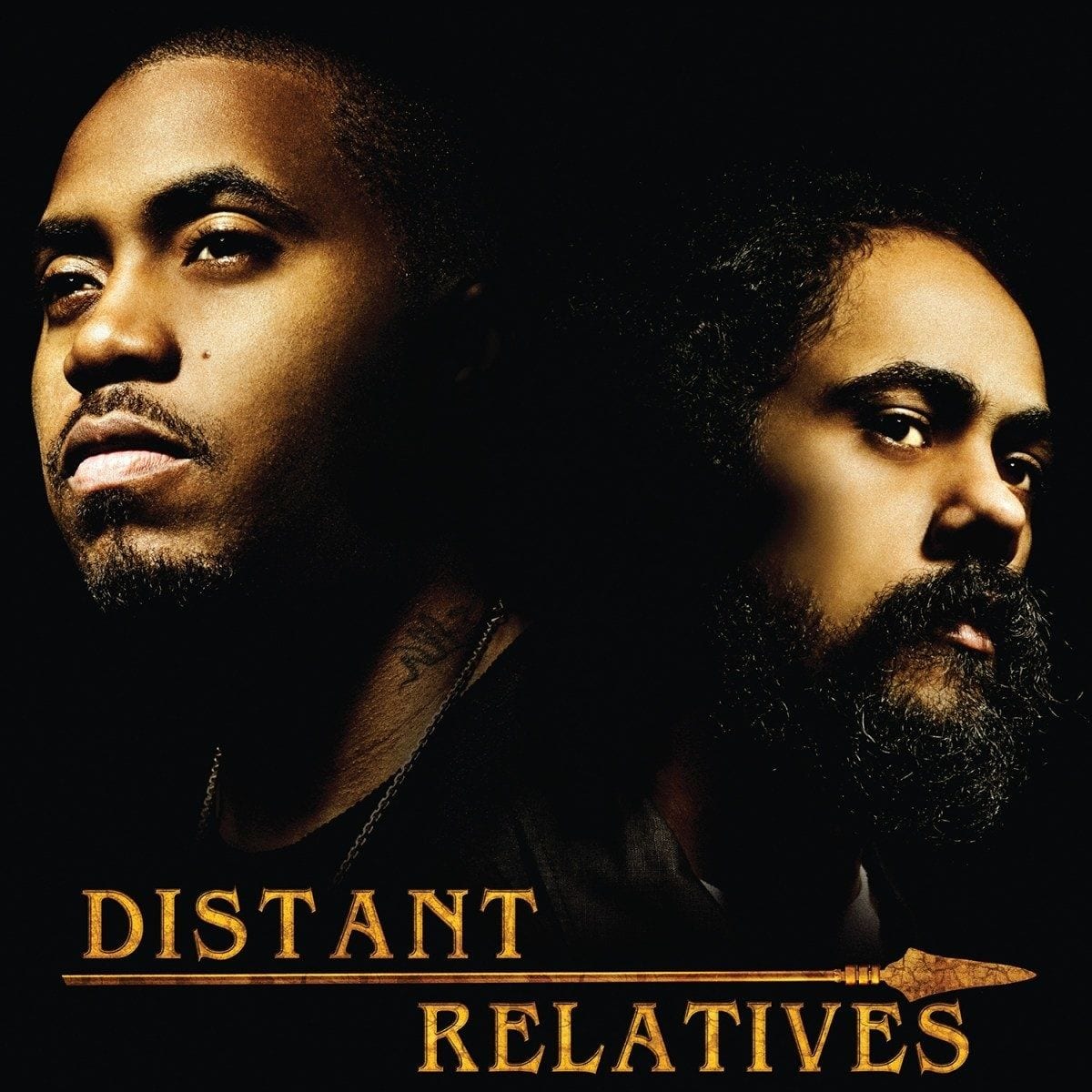
Ever see The Odd Couple, the television series about two roommates who couldn’t be more different? One is clean and orderly, the other’s a slob, and they work through their differences in hilarious ways. That’s how the idea of Nasir “Nas” Jones collaborating with Damian Marley first struck me — not just because of Nasir’s divorce from Kelis (the Odd Couple characters were divorced), but also due to the difference in musical styles. “And my man’ll speak patois,” Nas rhymes about Marley in album opener “As We Enter”, “And I can speak rap star.” The worry was that this great rap artist, and son of a celebrated jazz musician, wouldn’t be able to match styles with a great reggae artist and son of a music icon. The collaboration works surprisingly well, with Nas continuing his string of (self-)righteous concept albums balanced against Marley’s life-worn vocals and roots-oriented music.
This last ingredient, the music, at least pressed pause on all that talk about Nas having poor taste in beats. Over a full, expansive band, Nas and “Junior Gong” tackle socioeconomics, leadership, and personal relationships with lyrical images of Africa and religion as the ties that bind the musicians, their topics, and their audiences. Guests include K’naan, Stephen Marley, Dennis Brown, Lil Wayne, and Joss Stone. Extra credit for a portion of the proceeds being earmarked for African relief projects. – Quentin B. Huff
8. Danny Brown – The Hybrid [Rappers I Know]
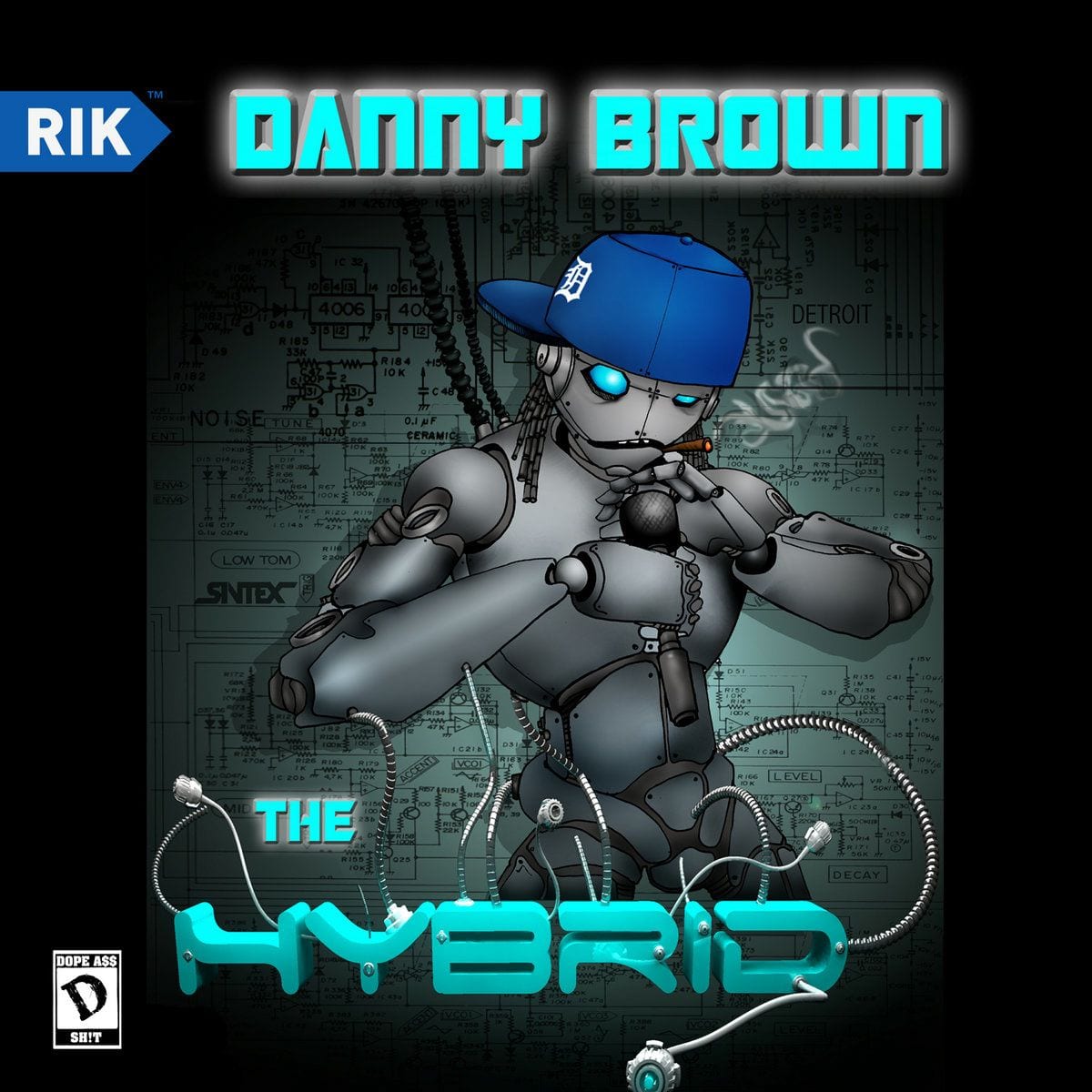
In a year full of breakout new rappers akin to the 2003 NBA Draft, Danny Brown stands tall above them all. The man is simply a distiller of the purest ideal of hip-hop: creativity. Whether he’s describing the reactions a pregnant woman has to his latest vial of crack, explaining the lack of good-natured activity in Detroit, exploring addiction to Adderall and alcohol, or simply clarifying that plenty of women have licked his member, it’s a guarantee Brown is going to do it like no rapper you’ve heard before. That The Hybrid was released for free on his Bandcamp is even more shocking.
If you’ve never heard Danny Brown rap before, it may take a while to accept his aesthetic. Brown raps in two distinct voices, one more regular and typical of hip-hop and one very animated, pitchy, and aggressive tone. The first few times I heard this album I couldn’t endear myself to the latter, but over time that delivery has revealed itself to be one of Brown’s greatest strengths. It allows his comparison of Adderall pills to Flintstone vitamins to come off as humorous and self-defeating rather than self-serious and admired. It essentially allows Brown to say a lot of remorseful, ugly things about the world he lives in and deliver it as though he’s aware of its ugliness, desensitized to it, and in the end a vessel for it.
The production doesn’t hurt matters, either. The album sounds prototypically Detroit, and does no good for anyone arguing Detroit isn’t the best place for hip-hop producers right now. The music is a very clean sort of grimy that works expertly off Brown’s more manic, rough persona and allows heads to nod that may not have come to fully appreciate Brown himself yet. This is especially true on the moodier pieces that close the album out, “Drinks on Me” and “Generation Rx”.
The Hybrid is an album that dutifully lives up to its name. Brown is both a tremendous gangsta-type MC and a beyond-capable conscious rapper, a guy who puts no effort into hiding who he is, but shows a special gift for recognizing the errors of who he’s become. – David Amidon
7. Slum Village – Villa Manifesto [E1 Music]
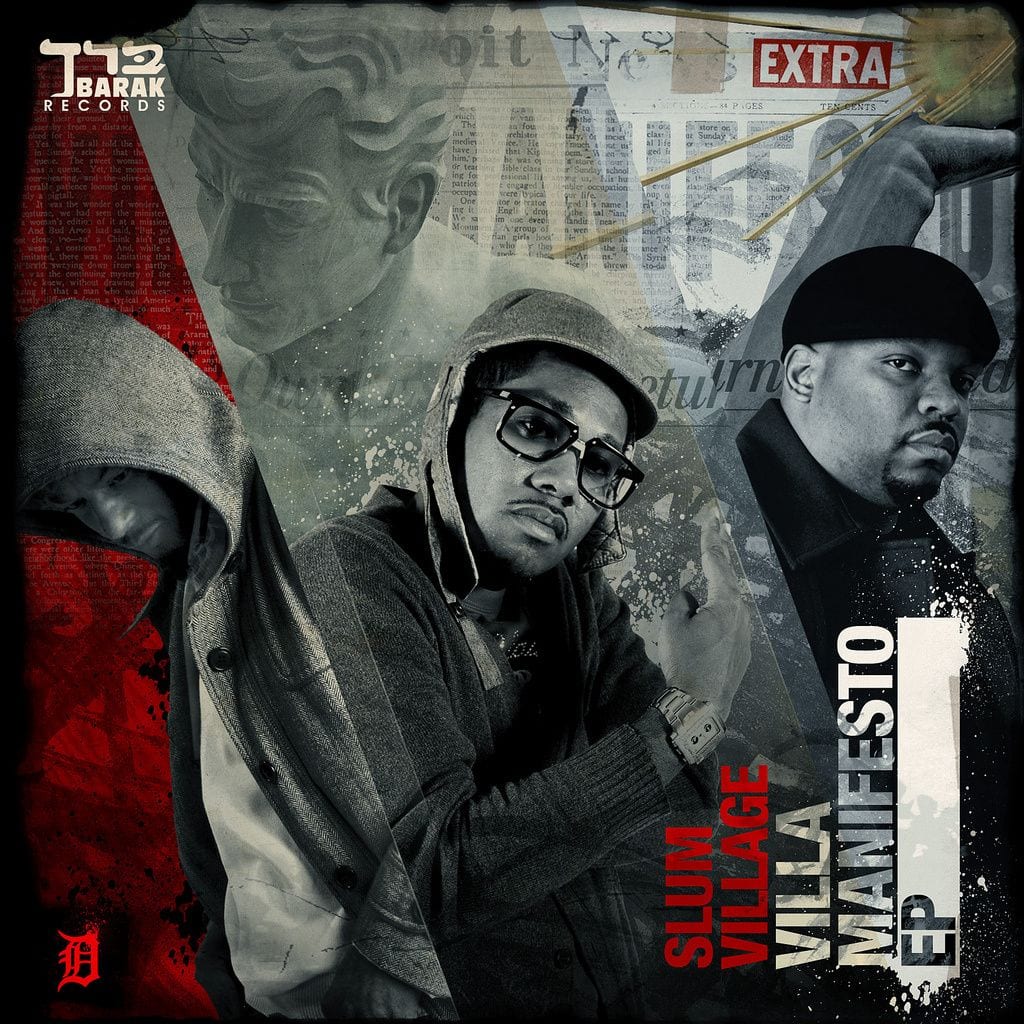
Enough could be written about the trials and tribulations of Slum Village to fill a book or green light a movie, but being that Villa Manifesto is the last document of the Detroit pioneers’ careers, it seems more appropriate to simply celebrate what a great album the crew turned out. Nowhere else will you hear Baatin, T3, J Dilla, and Elzhi all rapping for nearly an album. That in and of itself is nearly enough to sell the record on hip-hop. But musically, there is very little of Villa Manifesto that can be reproached, either.
“Faster” is a fantastic surprise of a pop song, something the group had never really tried to pull off before. “Dance with You” is the disco-rap cut you’d never have expected them to try either, while songs like “The Set Up” find Hi-Tek lacing up tracks he should have saved for his collaboration with Kweli, and “2000 Beyond” proves that any track with ?uestlove drumming is doper than dope.
The raps are perhaps not the main selling point of the record, but that speaks as much to the production as the skills of the MCs. Young RJ, Black Milk’s former collaborator, arguably one-ups Black’s own Album of the Year with his production here, a varied set of funky, soulful beats that have few peers in 2010. Baatin bears his heart in regards to his strong addictions on record for the first time, T3 and Dilla sound more in pocket than ever, and Elzhi, when the group allows him to appear, continues to certify himself as the most detail-oriented rapper in the home of 8 Mile.
Villa Manifesto is an album that consistently captures the artistic spirits of its members no matter what ill fates awaited them at the end of its production. It works as both an excellent point of entry for newcomers to the group, and as a perfect swan song for longtime fans. It’s a shame the group was never able to capture the sound of Fan-Tas-Tic again, but Villa Manifesto is without a doubt the greatest thing they’ve given us since. It’s a true shame we won’t get to hear anything more from them, but they had a hell of a run. Villa Manifesto is one hell of a victory lap. – David Amidon
6. Shad – TSOL [Black Box/Decon]
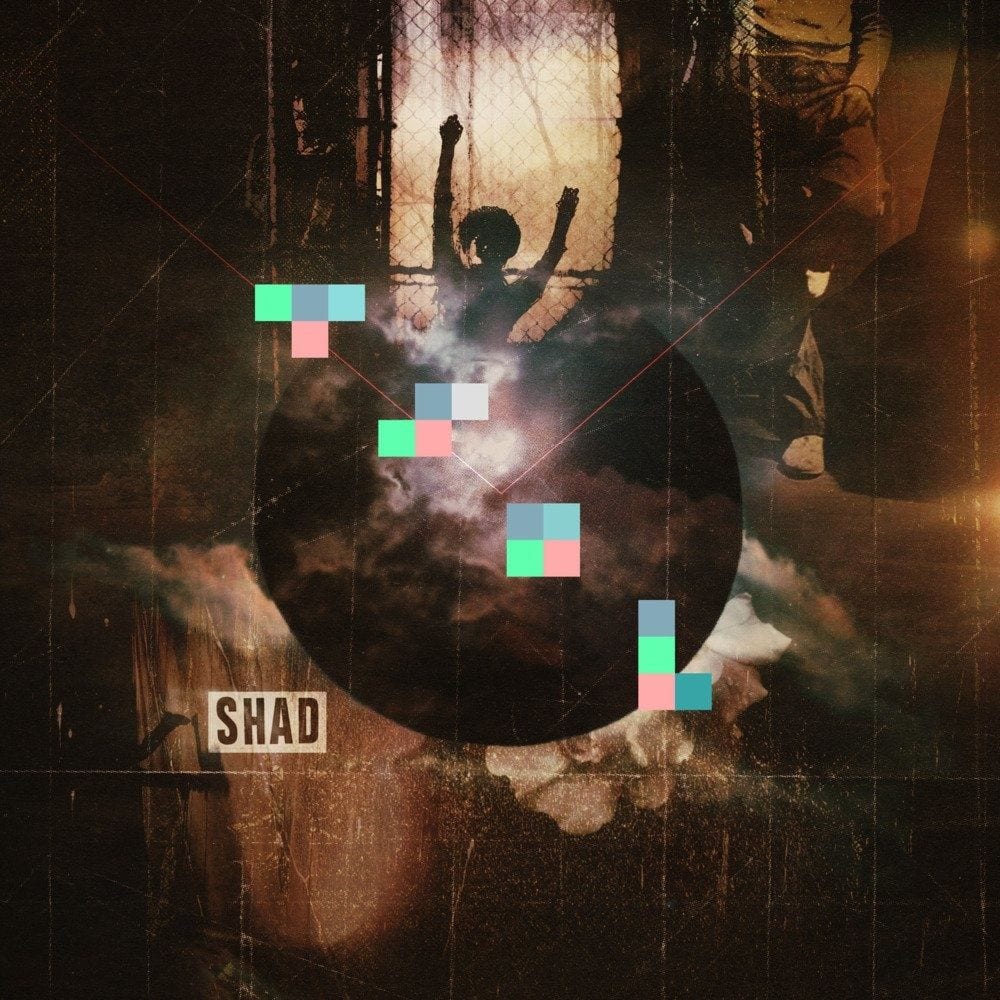
Shad is the sort of rapper that rappity-rap fans love to champion. His delivery is effortless, his voice is fluent and well-dictioned, his cleverness is above average, and his songs are adherent to specific concepts from beginning to end. As a small bonus, the guy rarely if ever swears either, making him perfect for children and parents alike. But don’t take that as a sign that Shad is gunning for Will Smith’s spot. Lead single “Yaa I Get It” blazes forward with a vitriol that’s impossible to ignore as Shad addresses his frustrations with the industry side of making music.
Songs like “A Good Name” and “Telephone” reveal a conceptual intricacy and open-heartedness that alludes to the more playful edges of the Fresh Prince, but never sacrifice tact for cheap laughs. He is truly an MC’s type of MC, rapping in a way that makes his words seem to be overflowing from his lips. His words bounce off of and react to each other constantly, creating tapestries of lyrics that are both easily relatable and interestingly designed works of poetry and music.
It’s true that Drake created a much more accessible album, one that undoubtedly received numerous spins from millions of listeners. I know I listened to his album more than this one. But anytime TSOL queues up, there is a different kind of atmosphere to it. Where Drake made a very good pop album, Shad made a fantastic hip-hop album. In the process, he becomes one of the rare Canadian MCs who could rightly declare their LPs not just some of the best in their country, but all of the year’s hip-hop landscape.
TSOL stands out in 2010 more than anything for being one of the most agreeable hip-hop releases of the year — give it just one spin, and you’re sure to find yourself putting it on again. And again. – David Amidon
5. The Roots – How I Got Over [Def Jam]
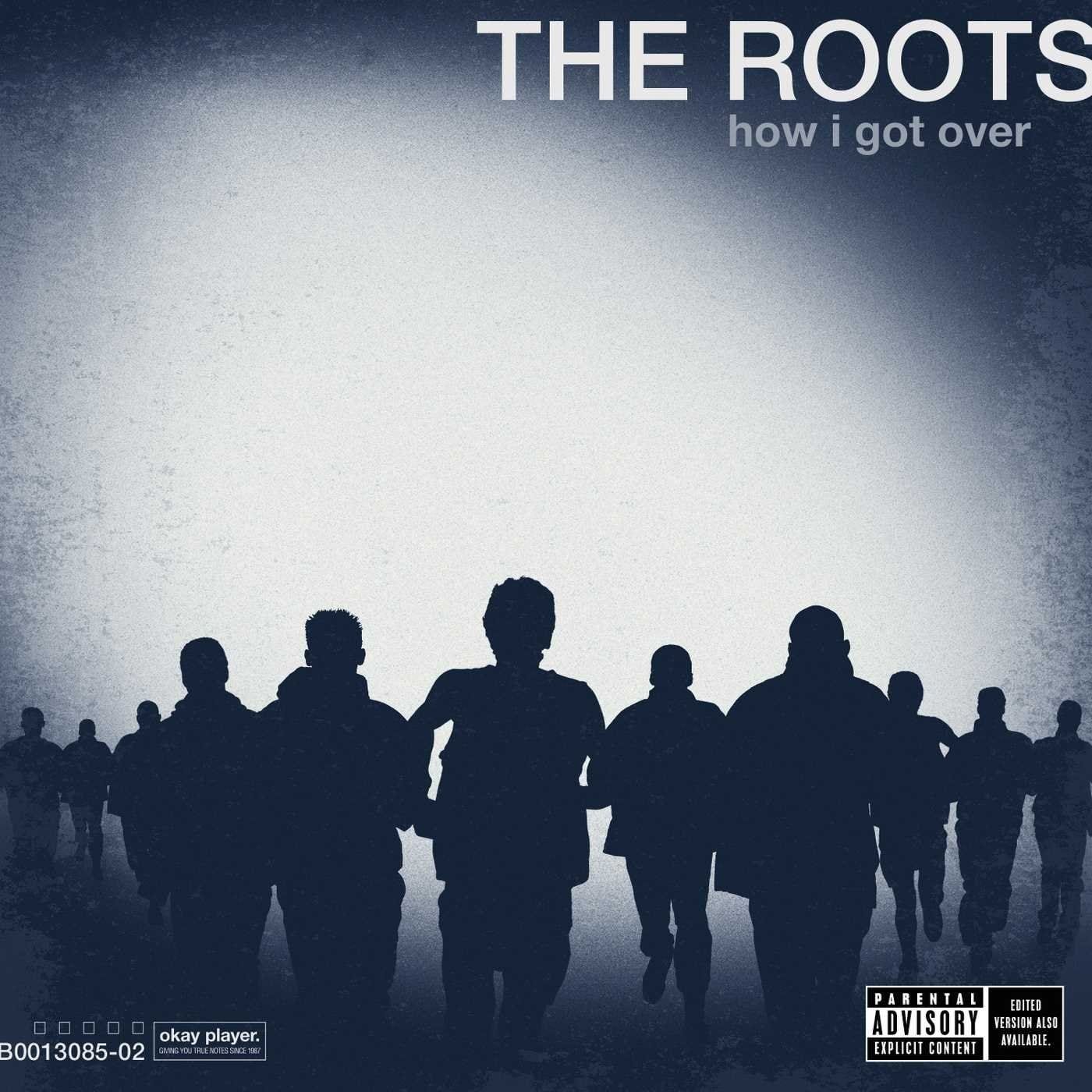
If you thought the Roots would stop bringing the musical heat because they became Jimmy Fallon’s house band, you were sadly mistaken. Ahmir “?uestlove” Thompson and Tariq “Black Thought” Trotter continue as the backbone of hip-hop’s beloved live act. Together, Thompson and Trotter provide hard, organic beats and rugged rhymes for trying times, from the solemn reworking of Monster of Folk’s “Dear God” to the frenetic “Web 20/20”. The album adeptly strolls through the melancholy and claustrophobia of our modern times.
Black Thought, the culture’s dependable lyrical workhorse, shifts gears with his heartfelt singing on the title track, while also magnanimously sharing space with artists like Truck North, Dice Raw, Blu, Phonte, Joanna Newsom, and John Legend. Of course, the main nitpick is “fewer guests, more Black Thought”. Meanwhile, the Roots address isolation, spirituality, and those life changing moments that test our perceptions of ourselves.
“Grown folks” music, you say? Try “great music”, period. Extra chuckles for literally doing it again in “Doin’ It Again”, as Black’s verses have appeared in at least two other places; one, on the 2009 BET Hip-Hop Awards cipher, and another time on the 2010 J. Period-helmed live mixtape. For those keeping track since 2006: Game Theory (2006) > How I Got Over (2010) > Rising Down (2008). Wake Up!, a soul collaboration between The Roots and John Legend, is worth checking out too (Psst! It’s got C.L. Smooth on it!). – Quentin B. Huff
4. Curren$y – Pilot Talk [DD172]
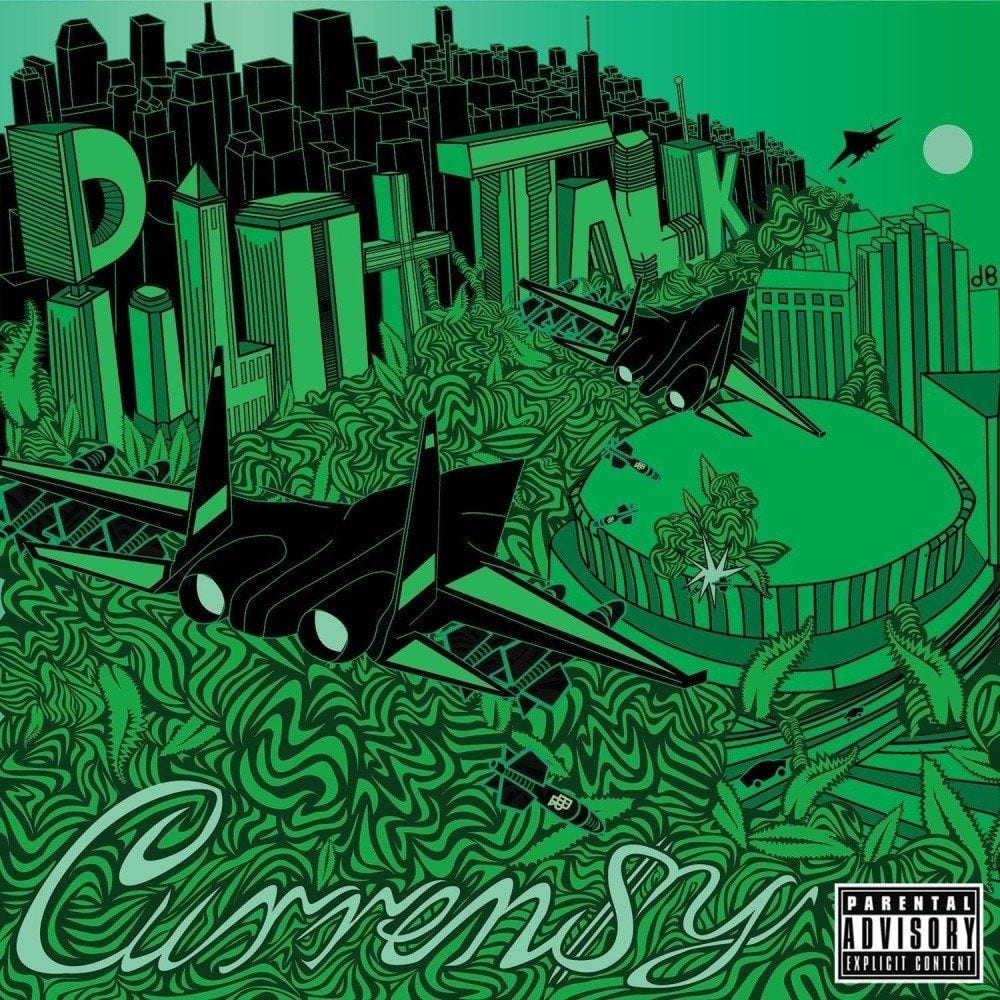
Curren$y is one of those rare label drama stories that not only ends happily, but finds the artist getting comfortable in the perfect atmosphere for him to create and cultivate his brand. After extended stays with both Master P’s No Limit and Baby’s Cash Money, during which at best he was considered Lil’ Wayne’s nicest protegé, Curren$y set out with skater Terry Kennedy to create Fly Society. The intention was a marriage of the jazzy, smoked-out atmosphere of groups like A Tribe Called Quest and Camp Lo to the motivational, drug-oriented lyricism of mainstream southern music.
While drama between the two led Curren$y to hand Kennedy the Fly Society brand and begin again with JETS International, it was the last bit of bad news Curren$y received before Dame Dash made his dreams come true. Pilot Talk, produced almost entirely by Curren$y’s favorite Ski Beatz, was perhaps the biggest surprise in a year of surprises. While Curren$y had always been a fresh, witty, stylish MC, for a long time it was often easy to drift away from his laconic delivery. But working with Ski seems to have pushed Curren$y to another level as a rapper, and focused him more than most artists.
It’s true that all his songs are about weed, self-motivation, women, and cars, but it’s the way he and Ski present these timeless ideals that makes Pilot Talk such a gorgeous album. “Breakfast”, co-produced by Mos Def, is iconic of the album as a whole. No grand ambitions, no delusional grandeur. Just tight rhymes about the simple life Curren$y leads married to a fantastic trumpet and bass that perfectly evokes the vacation Curren$y wants to evoke. Other tracks like “Roasted” and “Life Under the Scope” would have been the pinnacle of production in 2010 if it weren’t for Kanye’s magnum opus.
Pilot Talk is not an album that aims to surprise anyone, it’s just a brilliantly executed hip-hop album that makes the case for artists spending less time fantasizing and more time simply being themselves. In the process, it reveals itself to be one of the most endearing and listenable hip-hop albums in quite a while. – David Amidon
3. Big Boi – Sir Lucious Left Foot: The Son of Chico Dusty [Def Jam]
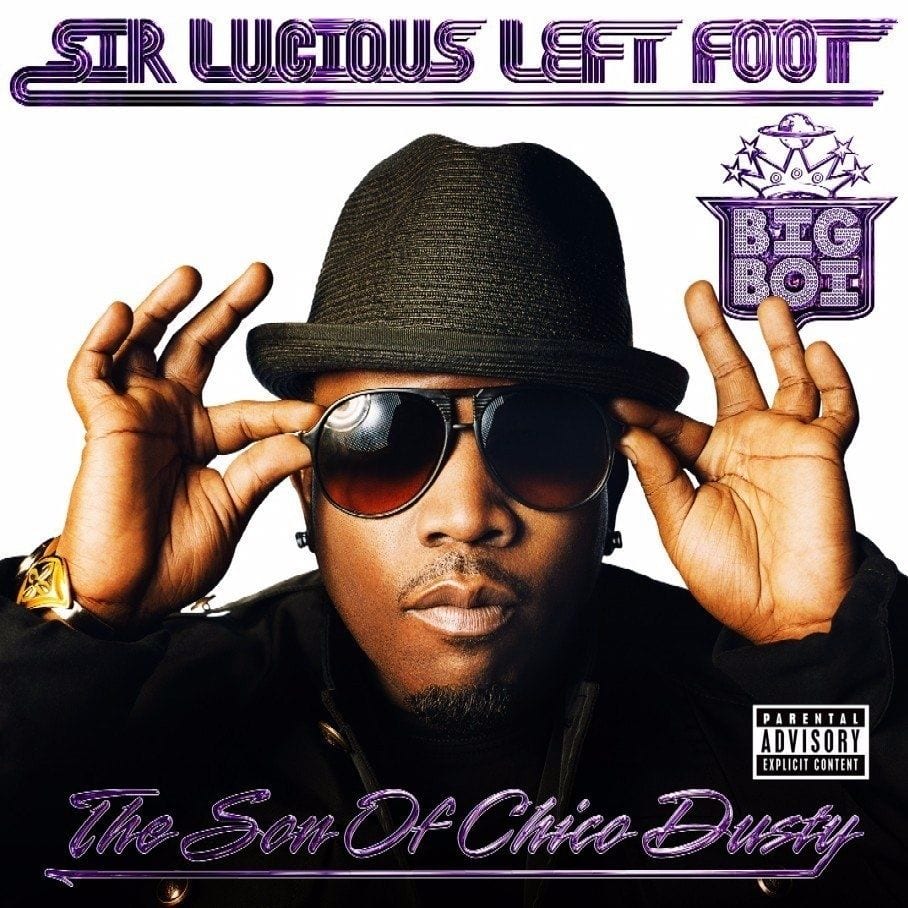
Comedian Dave Chappelle once joked that the Sunny Delight commercials showed the white kids celebrating a chance to drink the juice, but the black kid in the background prefers the nutrient deficient liquid in the back of the fridge: “I want that purple stuff.” Well, when OutKast released Speakerboxxx/The Love Below in 2003, everyone seemed enamored with Andre 3000’s oddball and eclectic The Love Below disc, and I was like, “I want those Speakerboxxx joints.” If Andre 3000 is the hare, then Big Boi must seem like the tortoise, operating a bit more methodically, conceptualizing if not always rapping inside the lines, and enduring his solo album’s numerous delays.
Finally, Big Boi shows us what he can do without his cohort’s idiosyncrasies since, except for the frenetic percussive beat of “You Ain’t No DJ”, Andre doesn’t appear. Although we all know the Andre-assisted “Royal Flush” would’ve been a great addition, we are nevertheless treated to guests like Yelawolf, T.I., Janelle Monáe, George Clinton, Too Short, and Joi. I’m just happy he managed to get Jamie Foxx to stop doing his perpetual Ray Charles impression. Meanwhile, Big Boi’s rambunctious wit is stuffed with imagery and clever allusions, riding rich and varied production with aplomb.
Big Boi’s day isn’t populated with a lot of lofty ideas (mostly women and wordplay), but it’s his delivery and dense musical backdrops that help Daddy Fat Sax sidestep the mundane. He writes “knock out songs” while y’all “spit punch lines for money”. And sorry, haters: I (yuck face) untracked skits, but I (heart) the pop hooks. – Quentin B. Huff
2. Big K.R.I.T. – K.R.I.T. Wuz Here [Direct Connect]
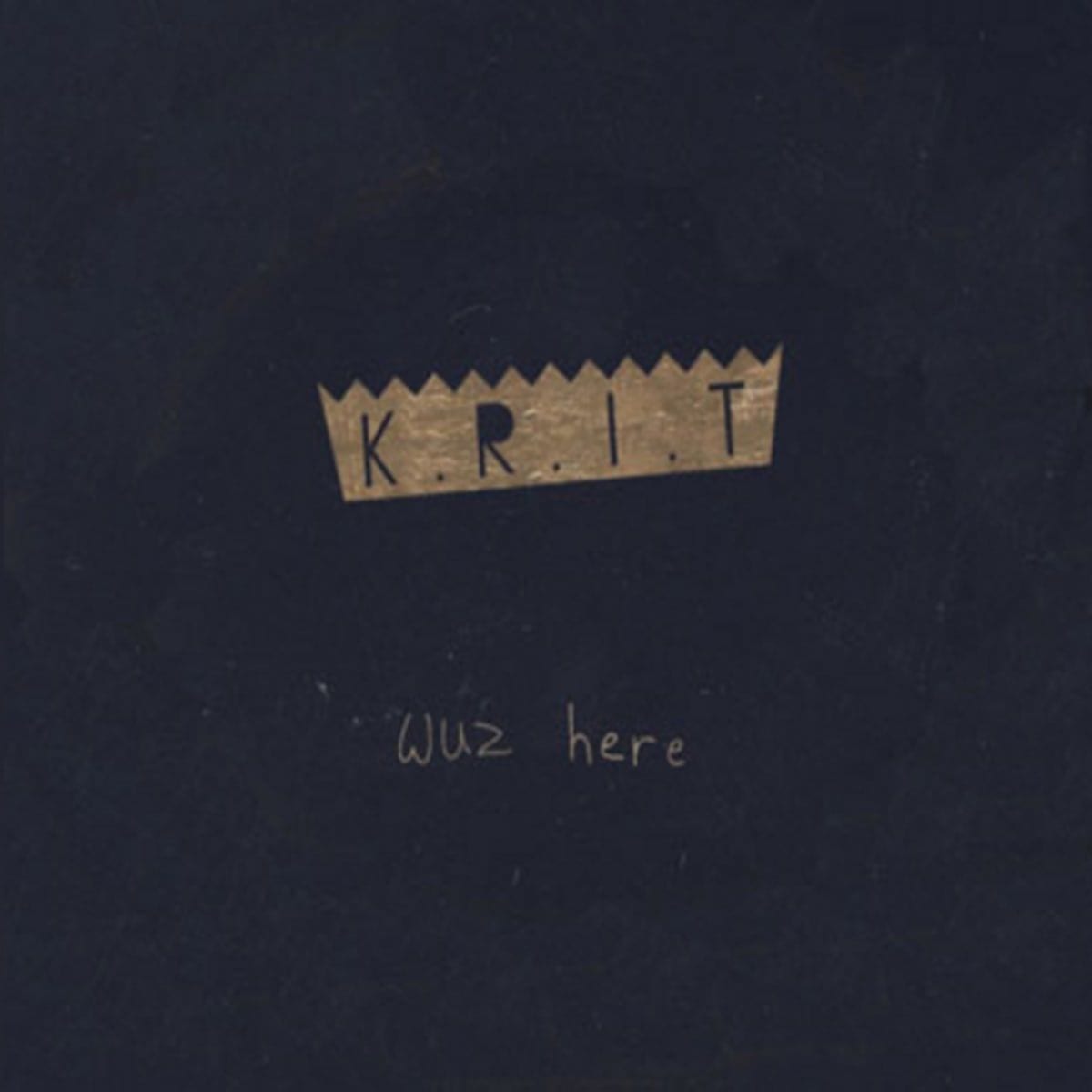
When Pimp C passed away in his sleep in December of 2007, an undeniable void was created in the culture of hip-hop. While plenty of artists have imitated portions of his style, from his funky, lush productions to his iconic nasal whine of a delivery and emphasis on pimping, no one was ever to captivate quite the same way Chad Butler could. His death was a shock to everyone, but equally shocking is that it didn’t actually take that long for that void to be filled.
Big K.R.I.T., hailing from the woefully unrepresented Mississippi, has been milling about the mixtape scene since 2006, but K.R.I.T. Wuz Here stormed onto the Internet as a free album seemingly out of nowhere. Over 20 tracks, we’re introduced to the amazing production talents and mic skills of K.R.I.T. Shorthand for King Remembered in Time, the rapper is seemingly a master of whatever he puts his mind to. Whether its smoker anthems like “No Wheaties” and “Glass House”, conscious tracks like “Children of the World”, “Something”, and “Hometown Hero”, or the hard but not quite gangsta boom of “Return of 4eva” and “Country Shit”, K.R.I.T. deftly and effortlessly applied his talents and came out with a fantastic product.
While the album can be somewhat hard to find these days — Def Jam signed him shortly after its release and put its foot down on most of the links — those who’ve had a chance to hear K.R.I.T. Wuz Here understand one thing clearly: not only is K.R.I.T. already worthy of the King moniker, he’s an MC that will undoubtedly be on the top of the pile for years to come. – David Amidon
1. Kanye West – My Beautiful Dark Twisted Fantasy [Def Jam]
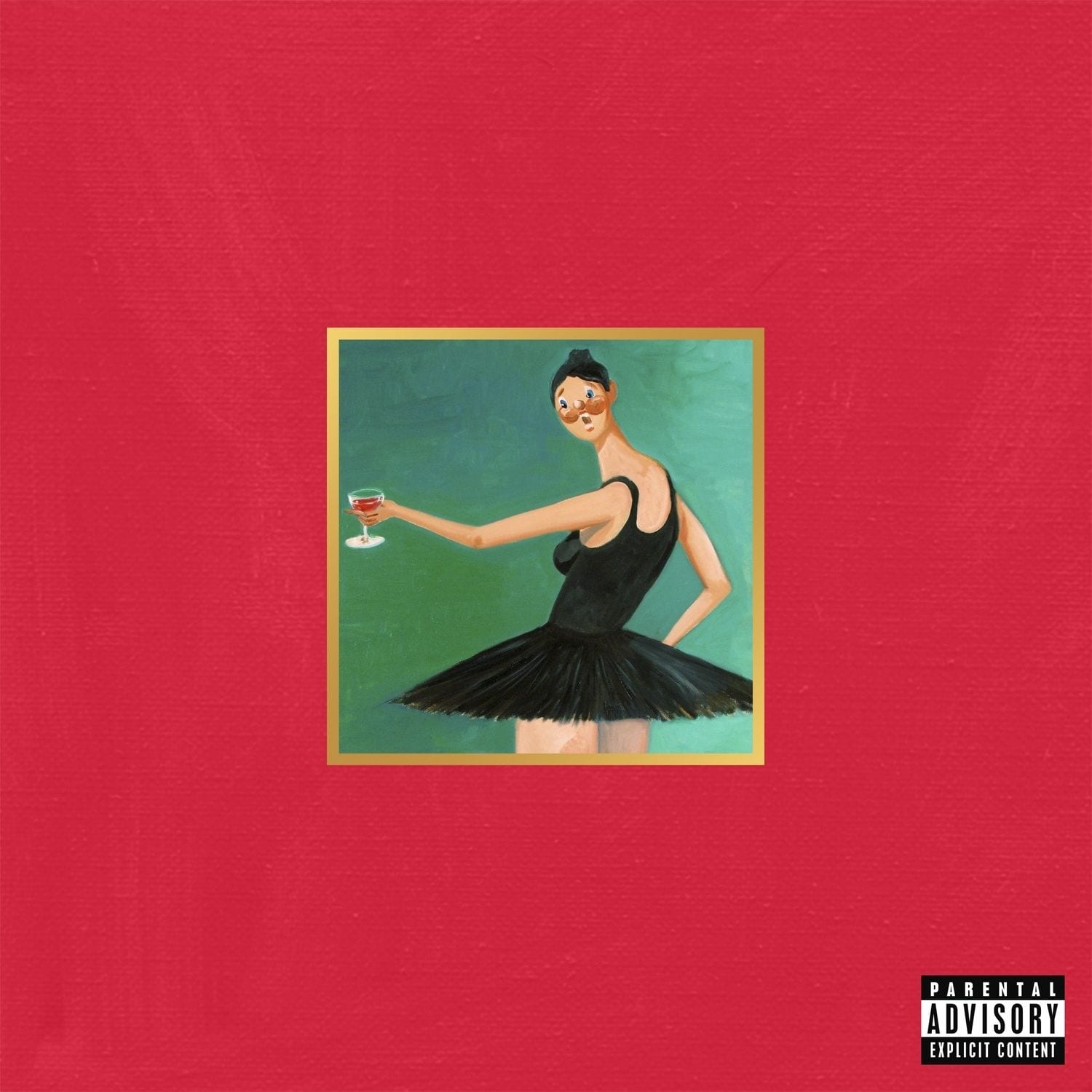
Come on, y’all. When George W. Bush went public with his feelings about Kanye West, did you really think it was news? Like, did you think he’d say he was happy with Kanye’s post-Katrina comments? Of course not! So let’s ask the tough questions. Have the former Commander-in-Chief wear those Dr. Dre headphones, give him a soft pretzel to snack on, and ask him, seriously, what he thinks of Kanye’s beautiful dark twisted fantasies. Ask him this: “Mr. President, do you think Kanye West is a Chi-town nigga with a Nas flow?” Or this: “Does everybody know Nicki Minaj is a motherfuckin’ monster? Because, quite frankly, I was a little on the fence about that.” I’d love to be the talk show host that gets him to say, “I mean this shit is fuckin’ ridiculous.”
My Beautiful Dark Twisted Fantasy is so fresh and so clean (clean), it’s hard to imagine it not being number one. Some say it’s too polished, too layered, too big for its own good. Yes, it is. “It insists upon itself,” Peter Griffin of Family Guy might say. Yes, it does. And here’s a little secret: It’s probably not the game-changing mega-moment that will rival the Beatles or Thriller or Dylan. Or Purple Rain. I don’t even like it better than The Ecstatic. Instead of inventing a “prog-rap” category to describe it, think of it as Dr. Dre’s Chronic or, more appropriately, 2001, meeting El-P’s I’ll Sleep When You’re Dead.
What I do love — more than playing “I Spy” with all the guest spots, more than the infinitesimal improvement in West’s flow, and more than his sample choices — is the sensory stimulation. There’s ear candy (all those instruments, voices, layers!). There’s eye candy (the videos, SNL performances, the album covers!). There are free but West-approved non-album tracks on the Internet. Even that weird 30-plus minute video got me, because it looked the way the album sounded.
I love the attention to detail. I especially love the quirkiness. I love the way the beat drops out in Kanye’s opening verse and the vocal effects in Nicki Minaj’s Busta Rhymes-like spazz out. I adore the lilt in her voice when Rihanna sings “want you to see EV’ry-THANG”, and that deep distorted vocal in “Hell of a Life” that goes “fuck with the lights (fuck), with the (with the) lights on”. I treasure the fact that the songs have definitive endings, and don’t fade, and the modest applause that’s the final sound of the album. I even dig that long vocoder solo.
The only thing I would do differently is remove “Blame Game” (sorry, y’all and Chris Rock) and then add G.O.O.D. Friday tracks “Christian Dior Denim Flow”, “Chain Heavy”, and “Don’t Look Down”. I’d make it a double album for the price of a single. Wait a sec. I can already do that with my playlist, hunhhh! Now I’m trippin’ off the power. – Quentin B. Huff
The Best Hip-Hop Mixtapes of 2010
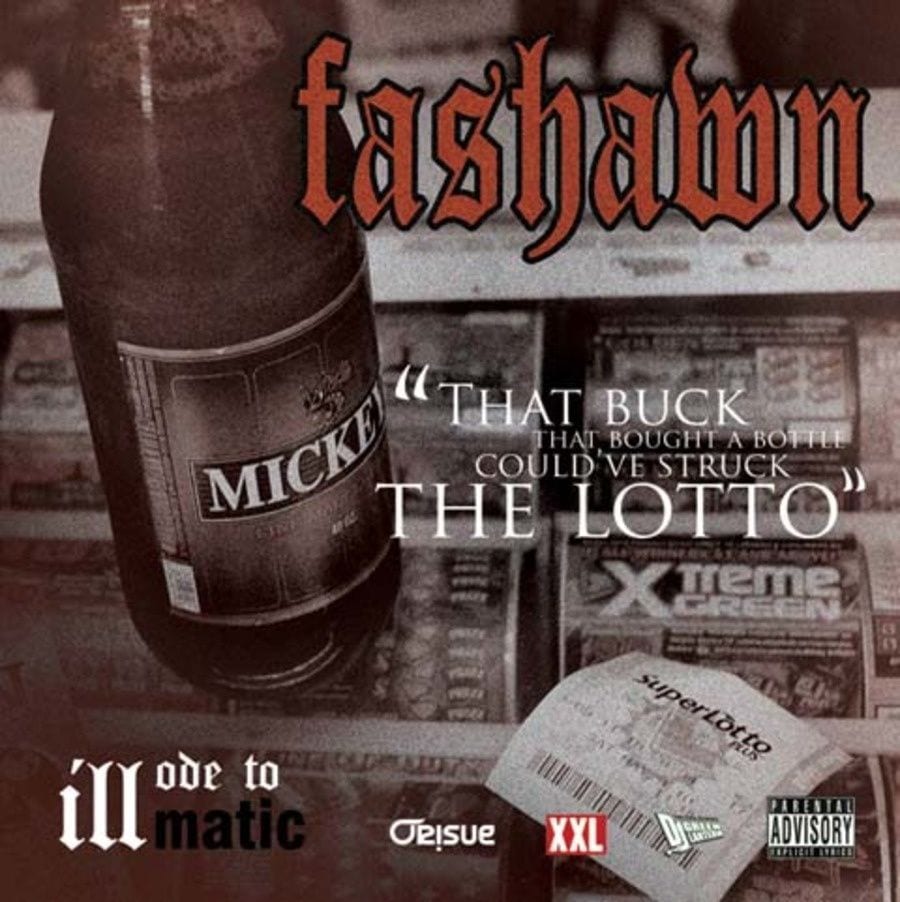
10. Fashawn & DJ Green Lantern – XXL & Orisue present Ode to Illmatic
A little honesty and self-awareness can go a long way. Take California’s Fashawn, fresh from his noteworthy debut, the 2009 Exile-produced Boy Meets World. Having already been compared to Nas, in terms of flow packed with detailed observations, his next move was to pay tribute to Nas‘ Illmatic in a mixtape that covers the original lineup. That 1994 landmark deserves tribute, for sure, but in rap there’s a line between paying homage and straight up biting, and that line is gossamer thin. In his intro, though, Fashawn acknowledges the dangers, saying, “I just didn’t want to bite it and rip it like it’s mine — I wanted to pay homage.”
And that’s what he does as he keeps the iconic instrumentals of DJ Premier, Large Professor, and Pete Rock mostly intact, while simultaneously navigating and escaping Nas’s bars of internal rhymes and street visuals. There’s a subtle tension between the verses, new versus old, as Fashawn weaves his cover songs in and out of the source material, tagging specific signposts in Nas’s lyrics along the way before making another departure into his own personal narrative. Talib Kweli snags the one and only guest spot, occupied in the original by AZ. I’m not sure there’s a full-fledged lane for cover albums (imagine scores of albums consisting of rap “standards” — yikes!), but this one is tasteful enough to earn a few moments of your time. – Quentin B. Huff
9. k-os – The Anchorman Mixtape
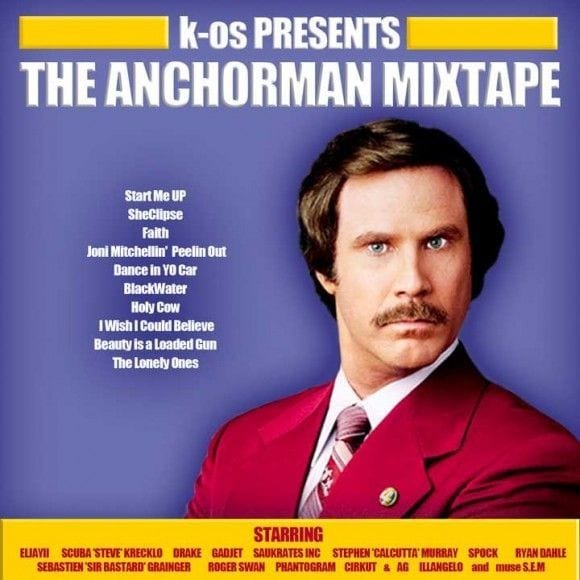
Mixtapes often employ television shows and movies as organizing themes. Wale’s Mixtape About Nothing and More About Nothing famously build on Seinfeld. Canadian rapper-singer-songwriter-musician k-os offers his own mixtape using the Will Ferrell and Christina Applegate movie The Anchorman: The Legend of Ron Burgundy. For years, k-os has been fusing rap with pop, folk, rock, and reggae, and doing it well, I might add, long before it was hipster cool to do so.
Here, his special blend is spellbinding, and so natural that it’s not a mash of genres as much as he’s giving his ten tracks whatever they require — a rock star drawl like Hendrix might’ve done, a plucky guitar solo, a fluid and effervescent flow, a synth-laden dance groove for the discotheque. When he calls himself “the fifth Black Beatle” and “the fourth Fugee”, I almost buy it. But why The Anchorman? Because rap is the Black CNN? Perhaps, but it has more to do with the mixtape’s running theme of male-female relationships and female empowerment, or at least tempering the chauvinism, that acts as a parallel to the movie’s plot of a female anchor holding her own in a 1970s male-dominated news market. – Quentin B. Huff
8. T.I. (Hosted by DJ Drama & DJ MLK) – Fuck a Mixtape
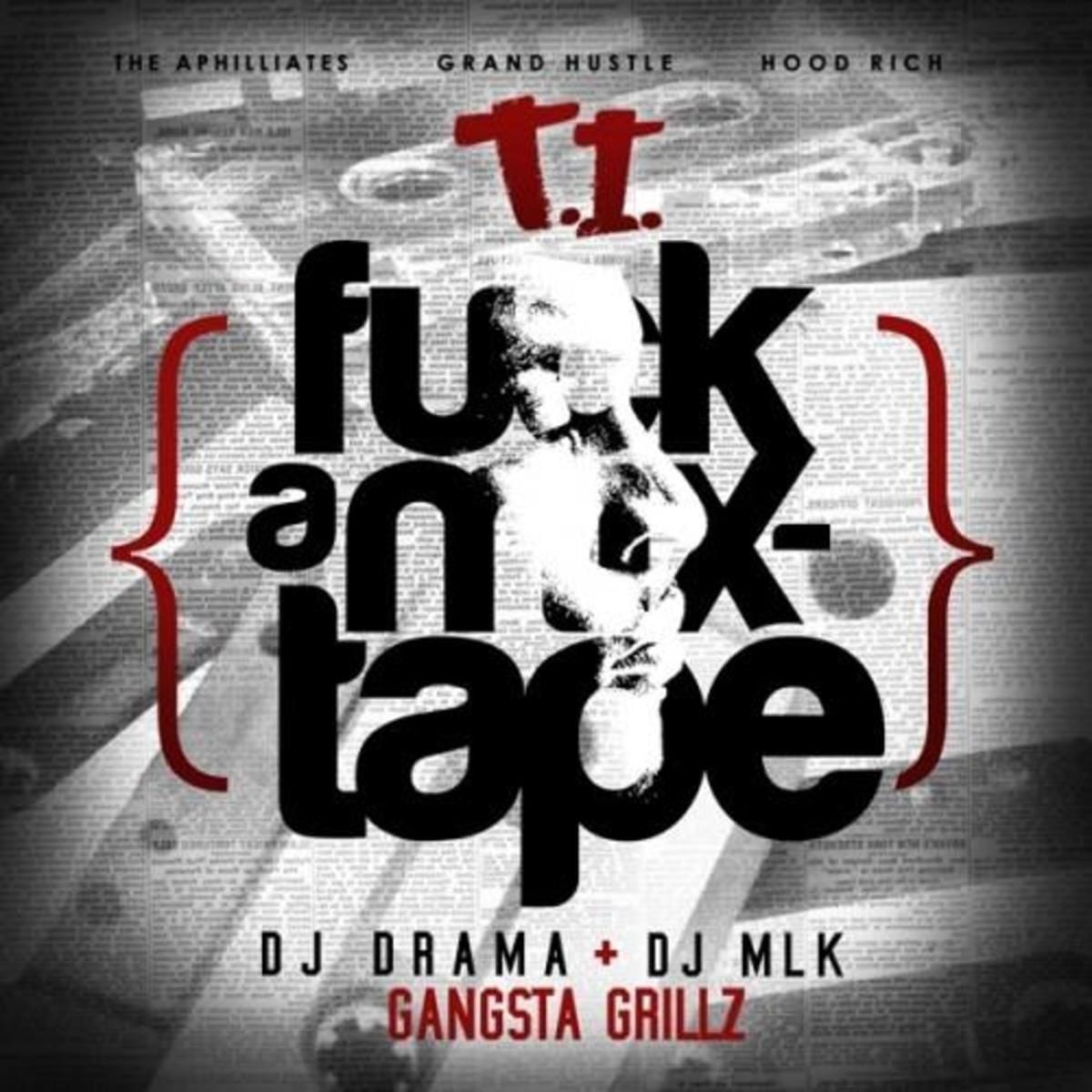
At this point, I think it’s reasonable for fans to start grumbling about whether we’ll ever hear a great T.I. record again. The man just can’t seem to stay out of trouble, and an artist is only going to receive so many chances before the label’s investment just isn’t worth the time their artist spends out of the public eye. Fuck a Mixtape was originally intended as a welcome back sort of release to get the crowd ready for King Uncaged, an album since retitled No Mercy and delayed indefinitely. While it wasn’t the greatest thing ever, being that it’s comprised almost entirely of outtakes from the T.I. vs. T.I.P. and Paper Trail sessions, Fuck a Mixtape did prove that despite the shaky artistic results of those albums, their production did hide some serious gems in T.I.’s catalog.
The outright winner here and main reason we decided to feature this tape is Tip’s collaboration with Rich Kid Shawty, “Get Yo Girl”. The beat is a surprisingly club-ready, street-approved fat burner from Jim Jonsin, over which T.I. delivers his most addictive performance perhaps ever, describing an overbearing friend of another woman that he has no interest in dealing with. The way he sneers at this friend is as audible as the words themselves, and it’s just a fantastically humorous and charismatic take on a club song.
But he also gives us a storytelling jawn over Ice Cube’s “Once Upon a Time in the Projects”, a song that feels two years ahead of its time on No I.D. and Killer Mike’s “Ready Set Go”, and introduces us to the illest Timbaland beat we might have never heard on “Here We Go Again”. “Yeah” is also a highly addictive Lil’ Wayne collab, with Wayne claiming “I’m me like a muh-fucka!”
The rest of the tape is mainly interchangeable filler (shouts to “Whatcha Sayin’ Tip?” though) with flitting moments of T.I.’s signature impeccable delivery, but in a year that saw T.I.’s star slowly fade from one of the brightest out, the seven tracks here worth hearing are incredibly worth hearing. – David Amidon
7. Pac Div – Don’t Mention It
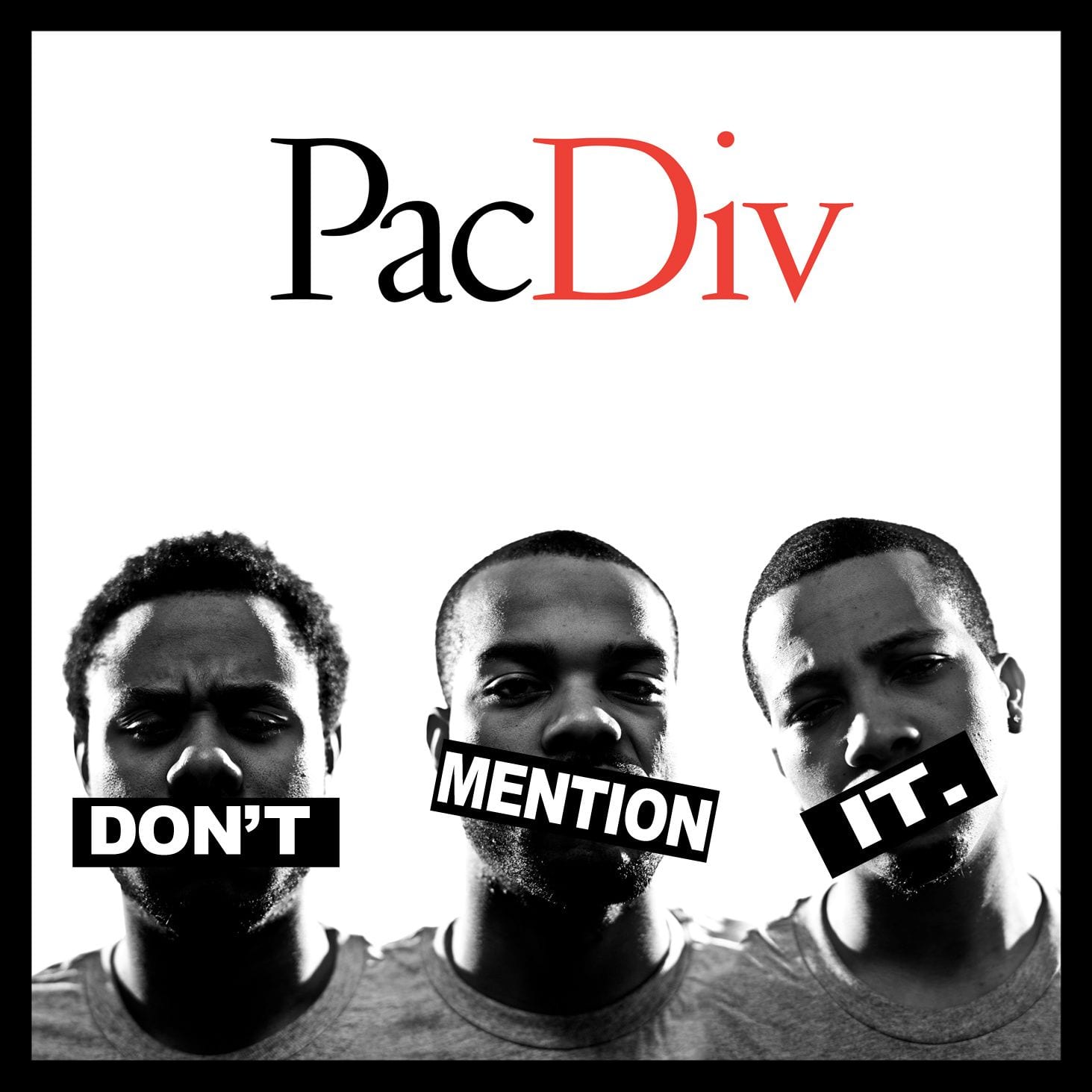
Pacific Division, or Pac Div, is a California trio with an inordinate amount of talent. They don’t display this talent through a wide range of topics. Except for songs like “Overcome”, they could go on and on about their smokes. If not their smokes, then their women. Or their women who smoke. Or the women they’ve met while smoking. Or the smoking they’ve done while meeting women who smoke. Their womanizing is like How I Met Your Mother‘s Barney Stinson in rhyme, and then in triplicate, set to (mostly) minimalist and trap beats.
The fact that they can make songs with such well-worn material that anybody would even remotely care about is a pretty big deal. When they tell you girls follow them “like echoes”, there’s a chance of believing them, thinking it’s funny even. Pac Div won’t wow you with verbal gymnastics, but they’re convincing in their everyman lamentations about the usual boy-meets-girl routine, and strangely nonthreatening when they get all “love ’em and leave ’em”. Dope things about this mixtape: An interlude of a Martin episode, bird calls used as a production trick, a song about the fly-ness of waves in one’s hair, and a hook from ultra-hot guest Marz Lovejoy.
Not-so-dope things: some unrealistic hyperbole that offsets the everyday-dude styling, a couple of sung hooks that shouldn’t have been sung, and relatively simple rhyme schemes. – Quentin B. Huff
6. Yelawolf (Hosted by DJ Burn One) – Trunk Muzik
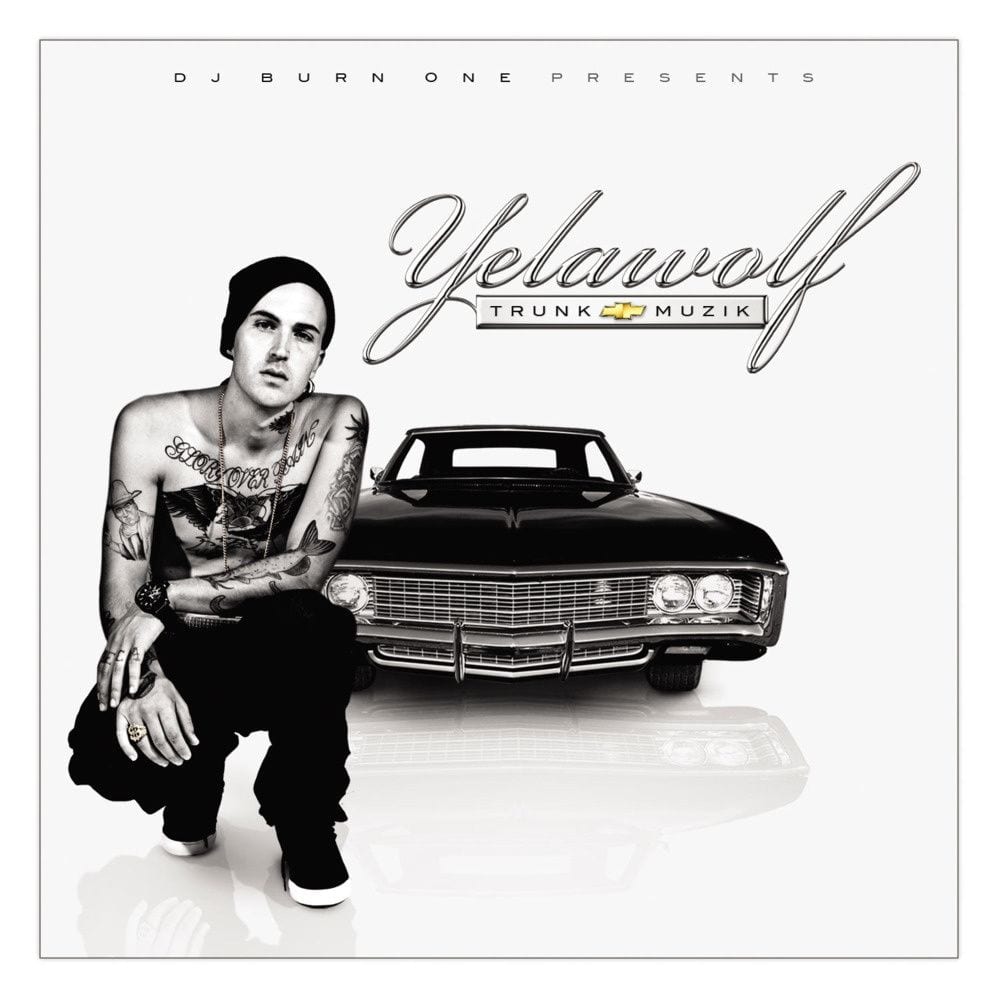
One thing’s for sure — you’ll never forget the first time you heard Yelawolf. His voice is one of the most vitriolic to arrive in a while, all pent up white trash anger and fleet-footed rhyme schemes. His tempo is a constantly malleable beast, flitting between normal, double, and slowed rhythms almost like an expert stick shift operator. Basically, think his star-turning verse on Big Boi’s “You Ain’t No DJ” for an entire album. Almost equally as notable as Yela’s vocals is the production handled mainly by Will Power.
True to the tape’s name, songs like “Lick the Cat”, “Speak Her Sex”, and “Trunk Muzik” are so overbearingly bass-oriented that proper sound systems practically drown the vocals out, washed away in an endless torrent of 808 bass. But when you can dig beneath the thunder, you’ll find quite a strong new voice in the south. “Pop the Trunk” is a strong, strong contender for single of the year, matching grim horrorcore atmospherics with a tense tale of poor white violence. “Love Is Not Enough” examines the loneliness of poor southern life over an interpolation of Devin the Dude’s “Anything”, capturing the essence of that song’s message while twisting it into something personal to Yelawolf.
“I Wish”, featuring the suddenly inescapable Raekwon, details Yela’s disgust with hip-hop media and fans that demand rap artists, particular of Yelawolf’s style, be black artists. He visits New York again with a Juelz Santana duet, slyly flipping an old Bob Dylan lyric (“Subterranean Homesick Blues”) into an ode to all manners of drug production. Trunk Muzik is simply one of the more unique releases on the mixtape circuit, and as we’ve done time and again, it feels worth mentioning Trunk Muzik is essentially a free album. In fact, Interscope quickly scooped up the rights and put the tape in stores in late November, with a new first half that’s a little more polished if not quite as enjoyable as Yelawolf’s original vision. – David Amidon
5. Wiz Khalifa – Kush & Orange Juice
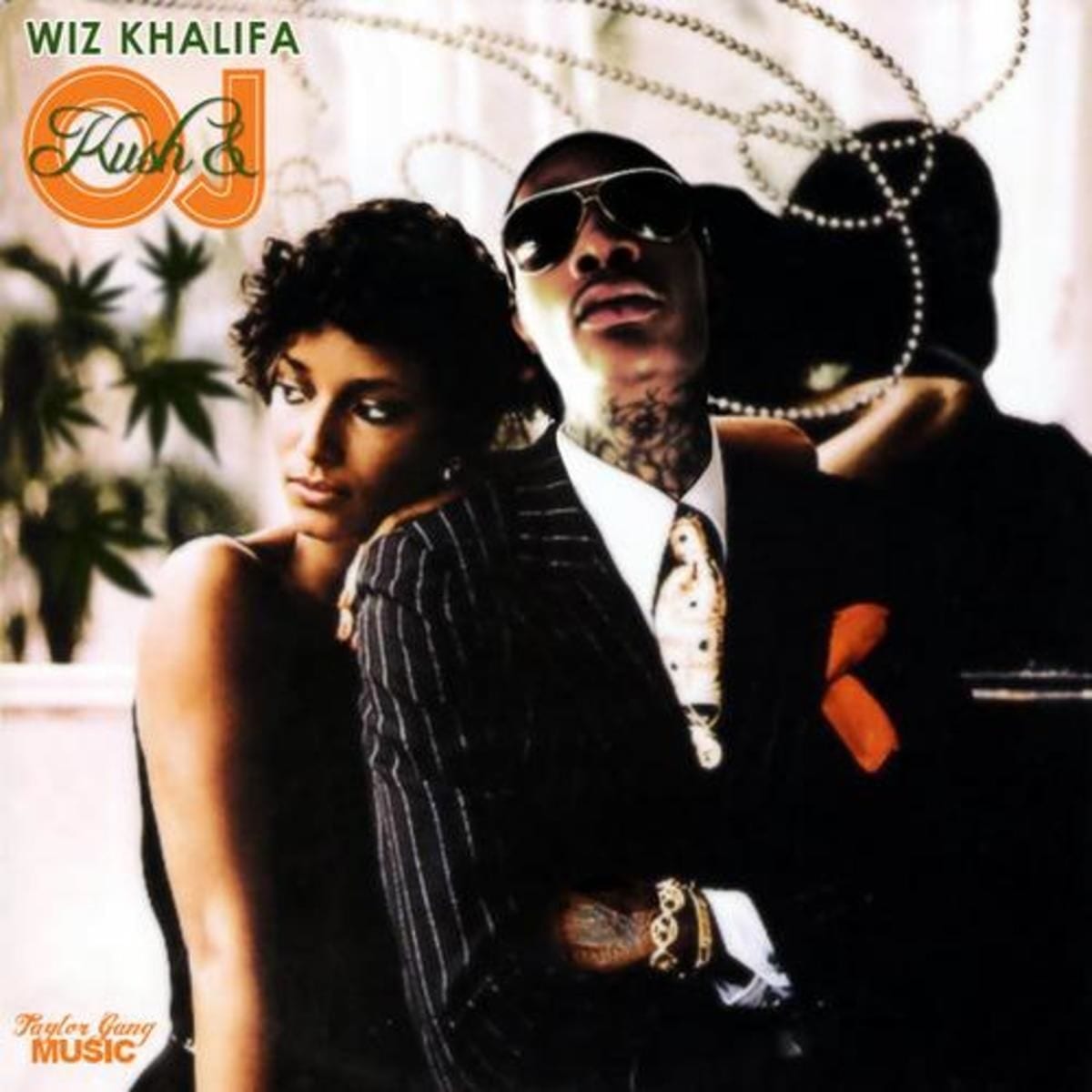
You may have noticed that “weed rappers” have consistently found placement on our lists. The phenomenon of rappers who rap nearly exclusively about weed and women has been mostly a product of Internet distribution, as these artists likely would never be seen as diverse enough to earn major label backing otherwise. But Wiz Khalifa has been able to parlay his poppy, laid back sing-alongs into a deal with Atlantic, and to celebrate Khalifa turned out his first front-to-back solid mixtape.
The tape was the first place most people could find “Glass House”, meaning it was the first introduction to Big K.R.I.T. for most of the world, while songs like the Chrono Trigger-sampling “Never Been”, euphoric “Pedal to the Medal”, and “Spotlight” simply drip with undeniable swagger and good times vibes. But Khalifa proves he isn’t afraid to experiment a little, playfully rapping over a Demi Lovato sample on “We’re Done” and whipping up a pseudo-cover of Alborosie’s “Still Blazin'”. There are even a couple of tracks that perfectly capture the atmosphere of ’70s and ’80s soul, “The Kid Frankie” and “Slim Skit”.
Kush & Orange Juice is certainly a one-note album, and as such it’s somewhat reliant on your stomach for weed smoke and woman stealing. But small barriers aside, Kush & Orange Juice is the most satisfying pop release of the year from an artist whose momentum seemed more mercurial than any other in 2010. If you didn’t get this before the summer subsided, perhaps you should wait until it returns for the full windows-down effect, but in any season Kush & Orange Juice would be yet another album-like mixtape that could easily enter a Best Of discussion in either category. – David Amidon
4. Don Cannon & Young Jeezy – Trap or Die, Pt. 2: By Any Means Necessary
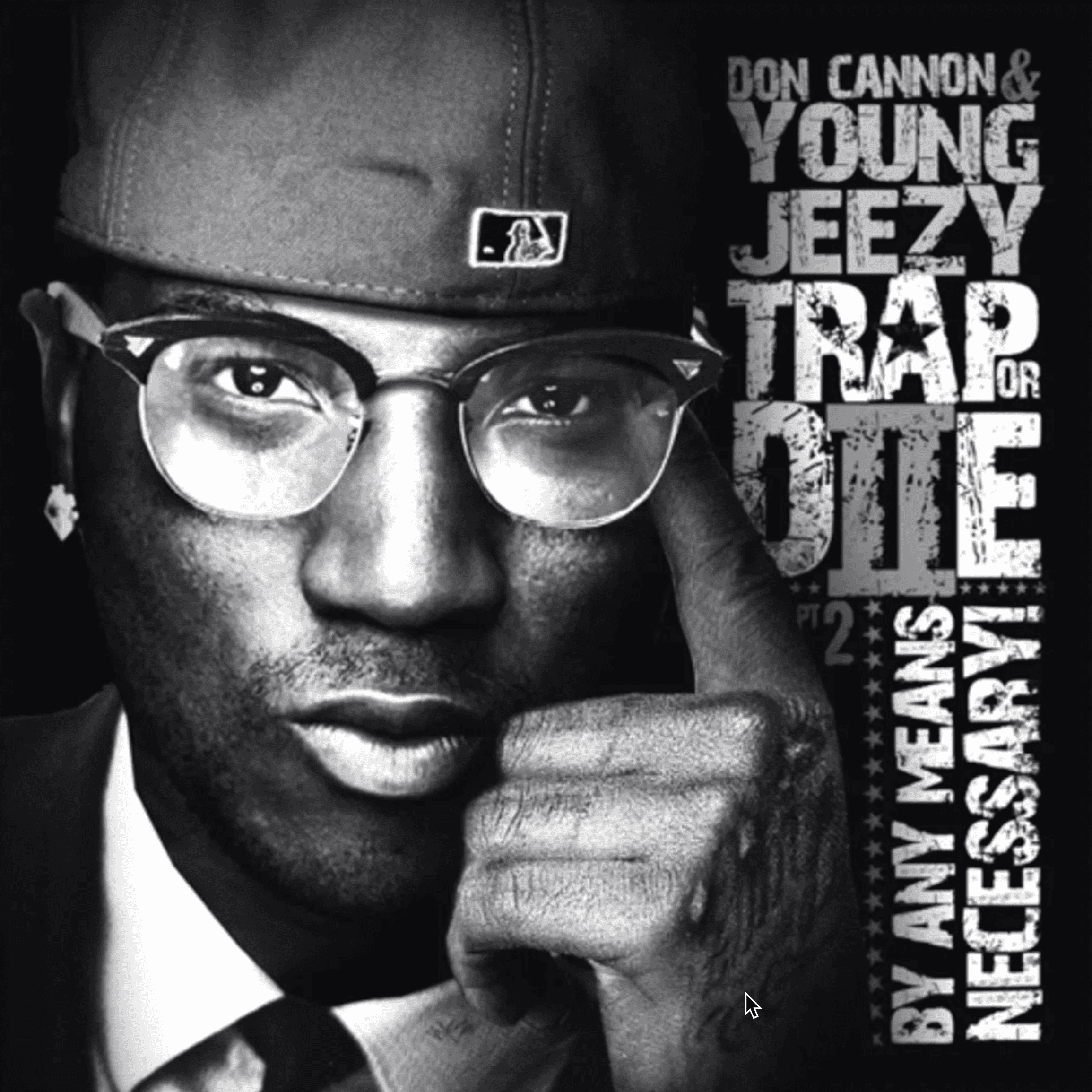
Young Jeezy feels like an artist who, by default, should be one of the most resilient in the game. His voice is so titanically unique as to be inimitable, and his angle to trapping so uniquely angled it seems almost impossible for him to be anywhere but on top as long as trap music remains relevant. Yet fall from the top is exactly what Jeezy’s been doing in the years since Trap or Die and Thug Motivation 101 hit the streets in 2005.
While 2008’s The Recession could be lauded for its new, more political take on Jeezy’s hood politics, it could just as easily be knocked for its stale production and a fair handful of songs that just felt like we’d been there, done that with Jeezy. As such, rival Gucci Mane’s momentum began to spiral out of control, mainly on the strength of increasingly acceptable mixtape rather than album work. With that in mind, and his upcoming TM103 mired in label drama, Jeezy decided to return to his roots mixtape-wise as well. In the process, he nearly crafted the release of his career. Most notable is how hungry Jeezy feels.
He rarely invites guests to join him for Trap or Die II, relying on two Bun B features, Scarface, Trick Daddy, Clipse, Plies, and Birdman to help diversify the 22 tracks offered here, but even more surprising is how rarely he needs the help. “Time” is a shockingly jazzy storytelling trap house joint, one of the coolest songs of the year. “Trap or Die Reloaded”‘s production is equally surprising, backboned by the most thunderous drum programming of the year. And then there are huge, monstrous street singles like “Lose My Mind” and “Trap or Die 2”, which not only feature the finest performances from Jeezy, Plies, and Bun B in perhaps years, but two of the freshest, illest beats this year’s trap scene could deliver.
The status of TM103 is still very much up in the air many months later, but Trap or Die II may as well have been the album anyway. It’s hard to imagine Jeezy doing much better. – David Amidon
3. J. Cole – Friday Night Lights
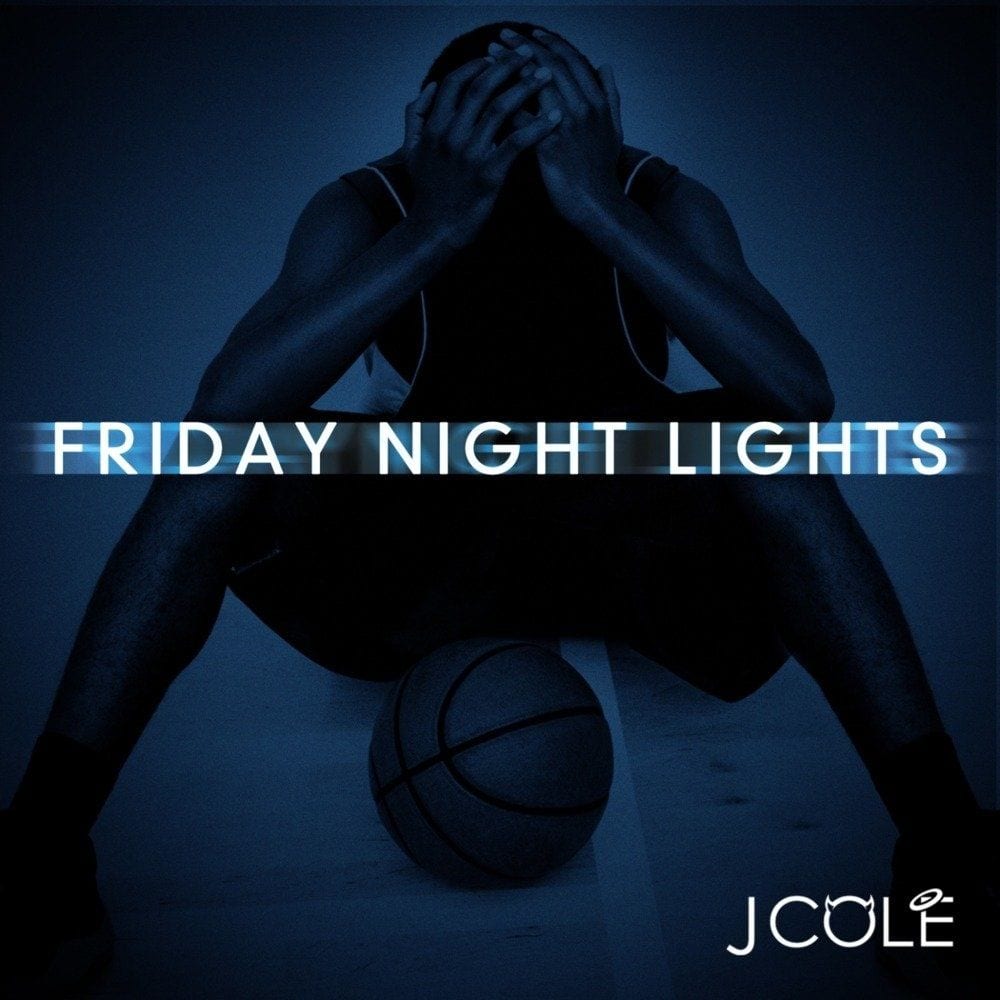
Stakes are high for J. Cole‘s debut album, although he’s already treated us to two mixtapes. Friday Night Lights, his third, takes stock of himself, his career, and his chances to maximize his potential. “I know my debut will ship, but is it gon’ sell?” the Fayetteville, North Carolina, native rhymes over Kanye West’s “Devil in a New Dress” instrumental. That’s from “Villematic”, a tip of the cap to Nas.
J. Cole is an interesting figure in the new class of rap talent, partly because the mere mention of his name gets people talking about “classic” lyricism, but also because he’s so mindful of his musical forebears, passionate about contextualizing himself within the rap continuum. He’ll acknowledge Nas with a song title, nod to Tupac Shakur by echoing his isolation and paranoia, pay homage to the Notorious B.I.G. (and Tupac too) by borrowing a line and reworking it for his own purposes.
Producing the majority of the mixtape himself, his ear for beats will often lean toward his favorites — Erykah Badu, Janelle Monáe, Aaliyah, Stevie Wonder, and Billy Joel. Mo’ skills, mo’ problems, I suppose, but what I really dig about Cole — aside from the enormous talent, slick one-liners, and dope delivery — is his voice. Especially when he adds a little bit of Tupac (think “Pain”) and Scarface’s world weary gruff to it. “Your shoes too big to fill?” he taunts in the bonus from the G.O.O.D. Friday series, “I can barely squeeze my toes in them.” – Quentin B. Huff
2. Starlito (Hosted by DJ Burn One) – Renaissance Gangster
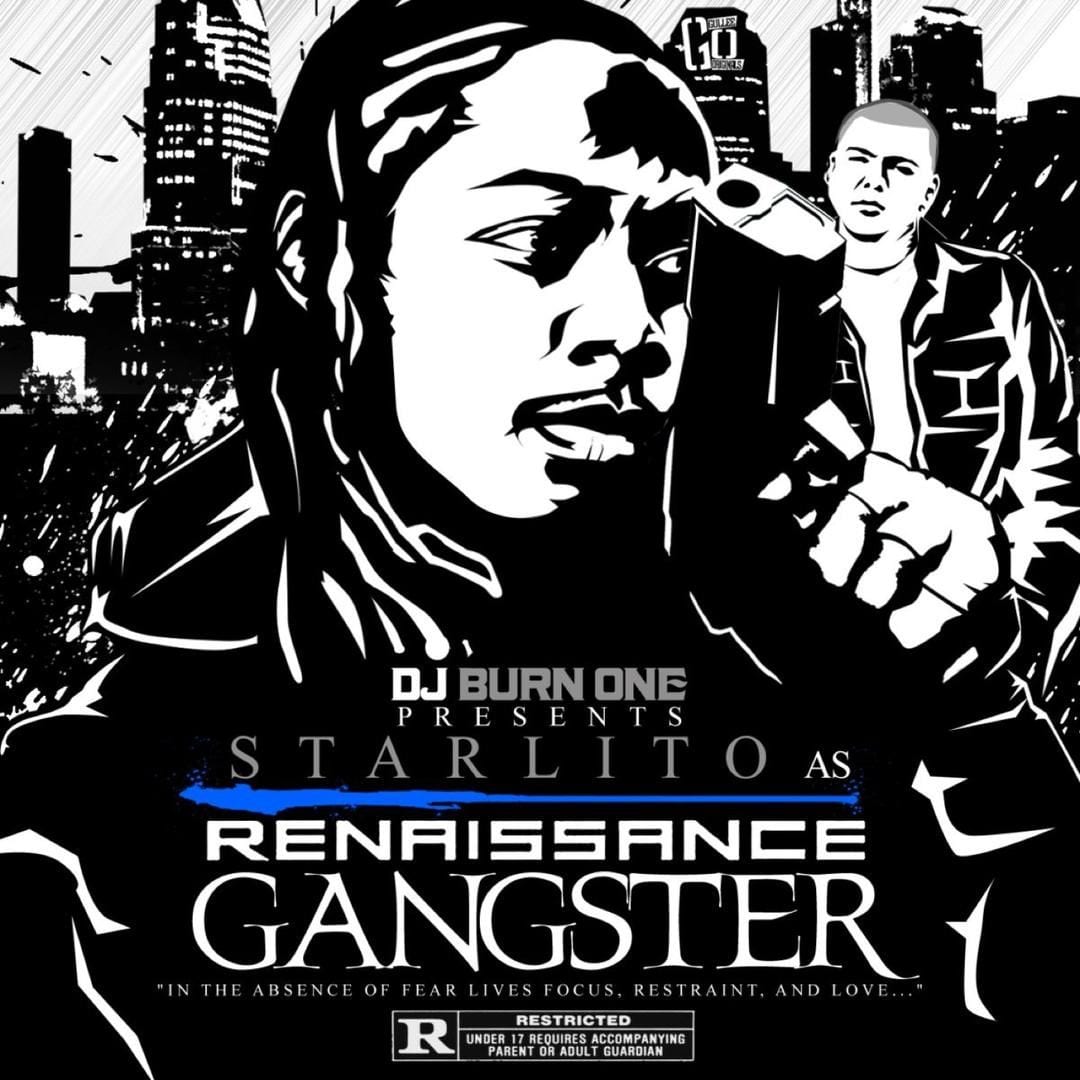
Like Curren$y, Starlito festered for years in the dark crevices of the Cash Money camp, feverishly trying to find that one hit record that would break him out of the shadows. Unlike Curren$y, however, Starlito hasn’t made the move out from under the label. Instead, he’s become one of the most consistent artists on the mixtape scene, managing two congruent series, Tenn-a-Keyan and Starlito’s Way, that each have three massive volumes within their ranks. But a lot of these releases have been mired by so-so beats and Starlito letting his worst tendencies get the better of him. Not so with Renaissance Gangster.
Like many mixtapes in 2010, it’d be hard to argue with anyone claiming Renaissance Gangster was an album, albeit a short one. At only 11 tracks and 42 minutes, the album is exceptionally compact by hip-hop standards. Which works to Lito’s advantage exceptionally, as he often eschews straight up choruses for more minor key refrains that often feel like they are just a familiar end to each verse. His slow, heavily affected drawl is perfectly suited for the stoned, glistening atmosphere provided by DJ Burn One, especially on tracks like “January Wrist 2.0”, wherein he borrows a hook from an old collaboration of his: “I got a January neck, a December wrist, and keep a bitch hot as summer swangin’ on my dick.”
The tape’s effortless charisma is akin to Curren$y’s dominant Pilot Talk. Unless incessant weed talk just isn’t your thing, it’s also equally essential. – David Amidon
1. Freddie Gibbs – Str8 Killa EP / Str8 Killa No Filla
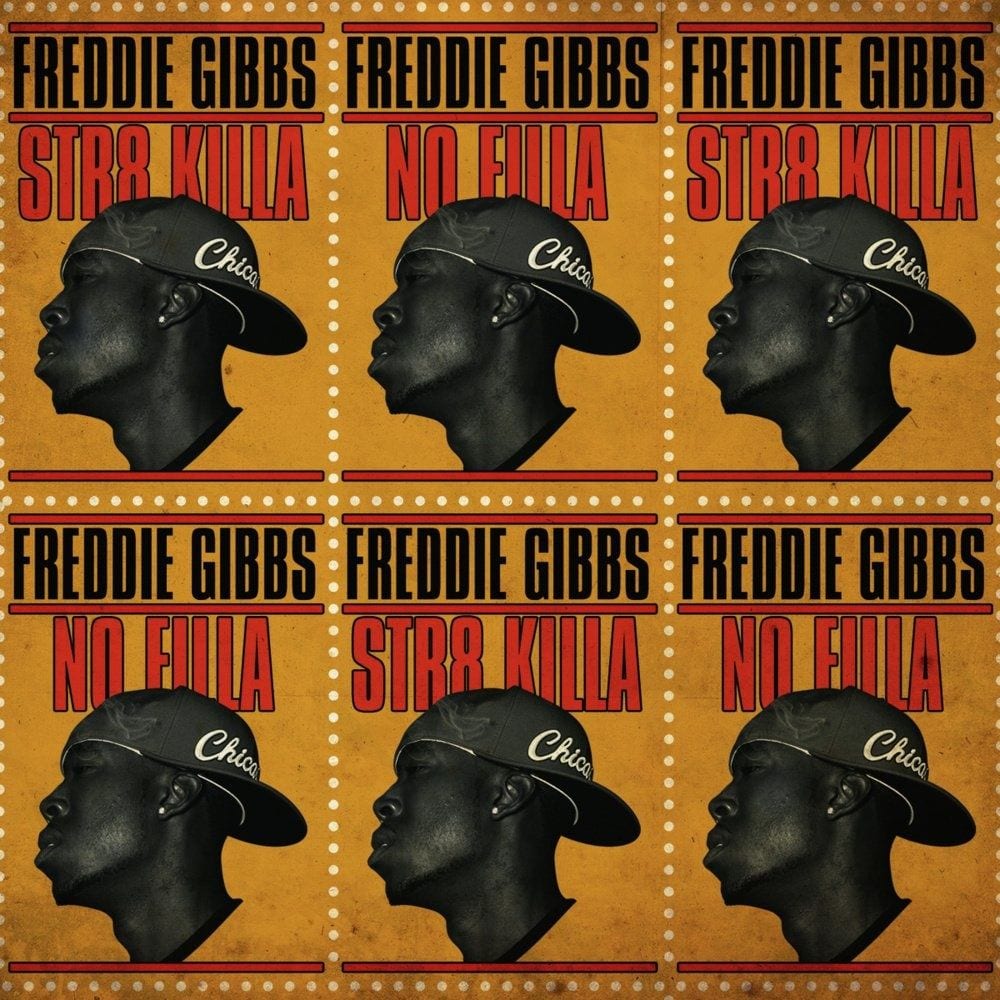
There are still some problems that most mixtapes inherit just by their nature. Incoherent styles of production, songs that end before their time, DJs hyping themselves endlessly. MCs spitting filler bars they’d never use on their album. But with the rise of Internet distributors like Live Mixtapes and the New Music Cartel, the past two years have seen artists making a conscious effort to improve the mixtape experience.
Nowhere was this more evident than last year’s Midwestgangstaboxframecadillacmuzik from Freddie Gibbs. The tape was better than most albums last year, and the Str8 Killa duo arrives as a similar gift from the gods. Arriving in DJ, No DJ, and an EP version available in stores (think Drake’s So Far Gone), Gibbs once again makes a disgustingly strong argument for being the greatest rapper out there. The EP contains the fantastic weed anthem “Personal OG” and classic Bun B collaboration “Rock Bottom”, while the mixtape contains a “Born 2 Roll” freestyle and some of the best tracks he’s ever cut, like “Crushin’ Feelin’s”, “The Ghetto”, and “Serve or Get Served”.
What makes the guy so appealing is that he approaches the mic with the sort of gangsta bravado required of most hip-hop artists, but he deftly balances it with an extremely warm heart and a desire to make life better for himself and his peers. His approach to rap is something that is endearing to nearly all fans of the music, and with the fact that his free releases continue to be stronger than most official efforts from his competition, it’s hard to do anything other than declare Gibbs one of the most essential upcoming MCs hip-hop has had in a long, long time. – David Amidon
In a year when Definitive Jux has gone on hiatus and Fat Beats has packed up its snail mail addresses for the greener pixels of its online presence, a healthy love of downloadable mixtapes makes a lot of sense. Most of them are free. Yet, the fact that mixtapes are often more anticipated, more exciting, and even more satisfying than traditional releases is remarkable. It is perhaps a return to the original block party that pushes the DJs back to the fore as mediator between hot new material and eager listeners.
Still, free music has been accompanied by a robust work ethic, but instead of hustling tapes out of car trunks like in the old days, artists took to the tools at hand, or fingertip: Facebook, Twitter, Bandcamp, and blogs. Kanye West, in particular, must’ve fantasized about this back when he signed up for Twitter, as he proceeded to turn the end of the week into the free track release day he called G.O.O.D. Friday. You can trace “Monster Mondays” (thanks, Swizz Beatz) and “Timbo Thursdays” (thanks, Timbaland) back to West. Meanwhile, Madlib churned out monthly Medicine Shows. Oddisee released seasonal EPs and travel-themed instrumentals.
Quite a few producers emerged from the background to take on microphone duties. Some of these we were familiar with, like Black Milk and Kanye West. Some we were glad to get to know better, like Kno and Nottz. Others took us by surprise, like Big K.R.I.T. and Roc Marciano. In addition to collaborating, we noticed producers who were experimenting with a wider range of techniques, song structures, and instruments. We’re seeing songs with longer running times, offering richer soundscapes to give room to more solos and varied textures.
Let’s not forget the ladies. When the discussion on hip-hop at last turned to them, a number of declarations came, including work from Rah Digga (Classic), Dessa (A Badly Broken Code), Eternia (At Last, with Moss), Boog Brown & Apollo Brown (Brown Study), Psalm One (Woman @ Work, a free album), Marz Lovejoy (This Little Light of Mine, an EP), and of course Nicki Minaj (Pink Friday). With Minaj, when was the last time a release by a female rapper was so highly anticipated?
In a year when Jay-Z publishes a non-linear memoir loosely organized around his rap lyrics, we’ve arrived at another crossroads to decode. Where will things go? Big, multilayered, and epic-sounding, like Big Boi, Black Milk, and Kanye West? Or sleeker, smoother, more pared down, like Big K.R.I.T. and Freeway & Jake-One? “Weed rap” or “emo”? Mainstream or underground? Old or new school? Sociopolitical or house party? This year it was all of the above. – Quentin B. Huff
 Smoke by werner22brigitte (Pixabay License / Pixabay)
Smoke by werner22brigitte (Pixabay License / Pixabay)
Best Albums
* * *
This article was originally published on 7 December 2010.

